#luca review
Text
Luca review

While the production notes for Luca promise “an unforgettable summer filled with gelato, pasta and endless scooter rides,” which actually sounds like a Miyazakian idyll, the reality is less, well, idyllic. The Pixar film focuses on timorous Luca (Jacob Tremblay), whose relationship with brash, older Alberto (Jack Dylan Grazer) is a bit reminiscent of Onward’s meek Tom Holland and overbearing Chris Pratt as elven brothers - though the addition of a strong-willed human girl, Giulia (Emma Berman), mixes up things considerably. If Miyazaki were to tell such a story with two boy sea-children and a human girl, probably the protagonist would be the human, since, unlike Pixar, the Studio Ghibli co-founder has always gravitated toward female leads. (In homage to Porco Rosso, the coastal town in Luca is named Portorosso, and vistas of puffy clouds floating in immense blue skies and crumbling stucco over ancient stonework are evocative of the Japanese master’s work.) The milieu, a small mid-20th century town on the Italian Riviera, isn’t so far removed from that of Miyazaki’s Porco Rosso, which was set in and around the Adriatic, including Italy, during the Great Depression. (That Ponyo was Miyazaki’s riff on Disney’s The Little Mermaid makes Luca’s echoes of the earlier Disney film - one of the sea-children collects human artifacts, and there’s some perplexity about forks - a little on the nose.) The premise of two young sea monsters living just off the coast taking on human form and venturing into the human world for a summer of discovery and adventure, including befriending a human child about their age, while agitated sea-parents search for them, obviously recalls Hayao Miyazaki’s Ponyo, only with twice the sea-children and twice the agitated parents. The charming elements work well enough to carry the film, but only just. In Pixar’s Luca, a gentle, overtly Miyazaki-esque coming-of-age period piece struggles under the heavy weight of iron-clad Disney/Pixar formula requirements and story beats.

0 notes
Text
How to Portray Real Love - and How Not to
Warning: long post.
Call Me by Your Name (2017)
To anyone who loves this movie:
I will not apologize for what I am going to write. It’s my own take, yes, but in my opinion all of this ought to be obvious to anyone watching the movie.
I will not refer to André Aciman’s book, not having read it.
I am Italian and I grew up in places like we see in the movie. I’m not denying that the way it’s shot and the general atmosphere are often gorgeous, but that was not sufficient to convince me that this movie is romantic, probably because I’m used to it.
What This is Not: Grooming / Sexual Predation
Reading up reactions to this movie, I have stumbled often over criticism about the age gap between the two protagonists. In my opinion this is beside the point: we are speaking of 7 years, not of a generational gap, and Oliver is still a student. Elio is mature for his age, and after some initial reticence, he approaches Oliver by himself over and over. His family knows and encourages (or at least doesn't oppose) them, and Elio has more than one opportunity to say no, which he doesn’t take.
Oliver is not a predator. He’s confused, but that’s not because he doesn't feel the attraction between himself and Elio: he simply doesn’t understand it.
Elephant in the room no. 1: Oliver is a bad person.
Oliver comes across as irreverent and self-absorbed. He does not respect boundaries, does not knock on doors, does not fit in with the lifestyle and customs of his hosts, only occasionally he does things that will make people think well of him. Early in their acquaintance he expects Elio to tell him what he is going on in his head but doesn't do the same in return (he never does, even later); his entire behaviour seems to be aimed at irritating and challenging his surroundings.
There is no depth in Oliver, no creativity, contrarily to Elio who already composes at age 17; somehow Oliver seems to know that he is the inferior one. At times he is downright offensive to Elio, for no reason at all, like he wasn’t a guest in their house. Oliver moves around in a foreign place like everybody owes him; he does not wonder, question, ask for explanations. He plays with Elio’s youthful insecurity, who is still hardly shaving and feels in the shadow of Oliver’s allegedly superior manliness. It is not surprising that to Elio he soon appears as some kind of handsome, unreachable prince.
Oliver is the kind of person who manages, on purpose or not, to convince the people around him that he is someone special, irresistible, and that being his friend or lover is a privilege. Elio falls for it, and Oliver picks the fruit of that attraction. Oliver does not love Elio because he does not love anyone, being too busy with thinking of himself.
At first Elio doesn’t like him; he notices that although Oliver never shows regard for anyone, he gets away with it. Elio’s family and friends fall for his self-assuredness and expect him to befriend Oliver. Piqued by the fact that Elio is the only person who is wary around him (with good reason!), Oliver repeatedly behaves in a way that frustrates Elio, repeatedly invading his private space, ignoring his limits, alternating insults with niceties, giving him attention one minute and completely ignoring him the next. And he never seems scheming picking at Elio’s insecurities whenever he gets a pass: it’s like second nature to him. He doesn’t do it because he loves Elio and doesn’t want to admit it, because he’s scared or something like that; he does it because he can, and because it works. He wants Elio to look up to him the way everybody does. After a while, the insecure Elio gets obsessed with wanting the older man’s approval.
Oliver starts a relationship with Elio knowing that the younger man has a girlfriend; he doesn’t even ask about her, whether Elio broke up with her etc. Oliver seems to believe that Elio owes him his undivided attention. By keeping their relationship a secret, Oliver makes the hapless Elio his accomplice. Even if he wanted to or if he would slowly begin to suspect that something's not right, he couldn’t talk to anyone about it. No one would believe him anyway, since everybody thinks the world of Oliver.
Oliver humiliates Elio, who by then is his lover, when he finds out about the peach: he laughs at him, not with him. (Why was Elio masturbating anyway, while he was in a sexual relationship?) When they are in Bergamo Oliver starts partying with random strangers on the street (with a woman!) when Elio is about to be sick: an observant lover would have noticed it before it was too late. Although they live under the same roof, he never sleeps in the same bed with him but gets up earlier, even when they are sharing a hotel room. He never tells Elio what is making him refrain from intimacy.
Oliver destroys Elio’s creativity by commenting negatively both on his composition and his impassioned love letter; we never see the young man making music or writing again. Shouldn’t a person in requited love feel inspired and happy and want to sing and play all day long? That he gives up on his interests already foreshadows the deep depression Elio is destined to fall into.
Viewers who love this movie like to argue that Oliver is so distant because he’s afraid of hurting Elio or shy because he’s in the closet. But it’s plain to see that Oliver knows exactly what he’s doing. He just doesn’t understand why because he’s not the kind of person who second-guesses himself. He’s controlling a power play with a younger man, probably because he doesn’t know how to have a genuine relationship with anyone. And Elio is too defenceless against him. When his mother comes to pick him up at the railway station and his voice breaks on the phone, it is obvious what a child Elio still is interiorly. He didn’t grow up through this relationship. He didn’t know what he was getting into and then had to pay the full price for another man’s egotism.
As the movie comes to a close, we can see that what he and Elio shared did hit Oliver harder than he had expected, but not enough for him to change, or only to reflect about it. Oliver is not aware of what he’s doing to Elio; to him everything is fun and games while to Elio it’s a life-changing experience.

Elephant in the room no. 2: Elio is not in love, he’s hooked.
Elio begins to imitate Oliver like a younger brother would do with the older - he smokes, wears a Jewish symbol on a chain, he has sex with Marzia only to prove a point because he knows Oliver had sex with Chiara. After a while, he gets obsessed with wanting the older man’s approval, for him to see him as an equal instead of an annoying boy he can either ignore or boss around.
Being both intellectual and highly sensitive, Elio believes that the more experienced and seemingly more mature Oliver must know the answers to life’s most burning questions; which Oliver doesn’t, as much as Elio wishes he would.
There isn’t the slightest sign of genuine love coming from Oliver; he only takes. Elio, being a giving, honest person, falls into a trap. Oliver has caught Elio and also half a dozen other people in his net, but he never had the slightest intention to put his roots down and actually like anyone back. Oliver’s attitude towards Elio is avoidant, but that is not because he wants to prevent him or himself from getting hurt; it’s because he doesn’t want to get attached and have to face the consequences.
In the scene where we first see Oliver interact with the family, he says at breakfast that he shouldn’t eat an egg because otherwise he’ll eat two, three, and more until they will have to roll him away. This already shows what kind of person Oliver is: he doesn’t know when to stop. Elio mistakenly believes that this lack of restrain, this want of limits is a sign of superior maturity and self-assuredness. He won’t realize to the last that in truth this attitude shows nothing short of a total lack of responsibility.
Elio says so to his father once: he does not play poker. Oliver is a poker player through and through. Despite the poetic request to “call him by his name”, Oliver remains shrouded in mystery. He does not change; while Elio wakes up, both sexually and emotionally.
There also is the symbolism: the dying fish gasping its least breath with eyes wide open (symbolizing Elio), the bronze statue, beautiful but cold and lifeless (symbolizing Oliver). The connection is made by the fact that both tokens come from the water.

All Oliver wanted and expected was to spend a good time in Italy with no strings attached. Which also is why we hardly see him working and studying, the way he’s supposed to. After all he did to Elio, his final revelation that he has a girlfriend and is about to marry her is only the coup de grâce.
Elephant in the room no. 3: Elio’s father is a fool.
I couldn’t bring myself to admire Elio’s father for what he said to his son, presumably wanting to comfort him: that “it had been a particularly beautiful thing between them”, and “he wished he would have made such an experience.”
How does he know what happened in detail? Does he know what is in these two young men’s hearts? Does he know about the humiliations Oliver inflicted on Elio? Probably not, but in any case, Oliver has given him no reason to believe that he’s a good person the way he claims.
We did not see father and son interact at all before this scene. All we learn is that both Elio’s parents expect their son to be nice to their guest and to befriend him, and that they don’t mind if there is more than friendship. We never learn whether Elio’s father loves him and cares for him (at least his mother shows affection from time to time). Imagine needing to have your entire world and happiness destroyed just so your father will finally give you some attention and kindness.
Elio’s father never changes his mind, even when he learns that Oliver is getting married. A caring, responsible father would have opened his son’s eyes about the fact that he was used and then discarded. I have no clue as to why any queer person would want their parent to do anything like that to them, leaving their heart open to bleed.
Add to this that he does not ask whether they used protection. The movie is set in 1983, and the first AIDS wave struck in 1981. Papa Perlman doesn’t seem to mind that his son might have caught a horrible, incurable disease, all that matters is that his son had sex with another male. Yay. (Maybe he believes in the adage that true love exists only between members of the same sex, who knows.)
I guess this little speech is meant to be politically correct. Woe if you dare to see the dysfunction in a relationship when it’s same-sex.
Elephant in the room no. 4: Elio did not need Oliver.
When we meet him, Elio is well-educated, living in a beautiful place where he also grew up, he has a supportive family, enough free time (they even have servants), he’s healthy and serene and he has a girlfriend. He’s intelligent, well-learned and creative.
When we last see him, he’s devastated, staring into the fire and crying for minutes on end.
Oliver is not “only” a sexual predator. He’s a textbook manipulator, the sexual part isn’t even what it’s about. Manipulators may want money, sex, attention from their victims or a combination of these, but what they always want is power. They rejoice in the knowledge that their prey is ready to do whatever they want at their command, that they can’t live without them, at least not happily. Oliver would have taken anything Elio gave him and crushed it, not just his sexuality.
Just imagine the pain Elio must feel now every time someone says his own name, or when he goes to his “special place” by the creek! He can’t compose, play the guitar or write any more, because everything reminds him of Oliver. And all of the time, Oliver had the chance to either avoid a relationship with him or to let go once he had left him; but you need some basic common decency for that.
Oliver realized quickly that Elio, though younger, is much better than he is, healthier, smarter, more accomplished, more innocent, honest and kind-hearted. Oliver took all that, used it or destroyed it and left Elio in the shards of his former self, no longer in a position to enjoy the things and the people he used to love, tortured additionally by the knowledge that Oliver is about to marry someone else, i.e. that Elio apparently wasn’t good enough for him. Elio ends like a modern Pygmalion, crying about the fact that all of his love could not bring the object of his adoration to life; hence also the parallel between Oliver and the statue.
Elephant in the room no. 5: Elio is not gay, he’s bisexual. (Maybe.)
Elio has a girlfriend when we first meet him; it is also hinted at that before Marzia, he was with Chiara. No sign of a boyfriend anywhere. No sign even of some brotherly male friend to whom he might feel unconsciously attracted.
Elio enjoyed his first sexual experience with Marzia, we hear him cry out “That feels so good!” He then starts an affair with Oliver, but nothing suggests that he likes it any better. Yes, he keeps sleeping with him, not with her; but she didn’t manipulate him for weeks into believing that without her he would be missing out, the way Oliver did.
If Oliver was a woman of 24 years who would seduce Elio, dragging him away from his girlfriend, and then dumping him to marry another guy, everybody would call her a heartless bitch. In this case, Elio’s supposed sexual awakening supersedes everything else. Which is probably the main reason why so many viewers insist that there was nothing wrong and unhealthy between them. The relationship between Elio and Oliver can’t have been sick and dysfunctional, because Elio apparently “needed to realize that he's gay (or bi).” Never mind that he was traumatized for life.
In the end, Elio is alone; Oliver has left him for good, and he can’t go back to Marzia. Had Oliver not interfered Elio might have missed out a nuance on his sexuality, but he wouldn't have had his heart broken, and he would have a girlfriend who is a sweet and kind girl, never manipulates him and even offers him friendship and comfort after he dumped her for no reason (after having taken her virginity no less).
Part 6: Elio Always Had a Choice.
Elio wasn’t forced to do anything. He sought Oliver out repeatedly and never actively said “no” to him, except for his heart-wrenching protest during the infamous peach scene. Maybe he wants Oliver to single him out being a victim of his own vanity; however, his personality is not explored enough for the viewer to come to a fair conclusion. We mostly see him react to Oliver, not act on his own.
Since the focus of the movie is on the Elio / Oliver relationship, the landscape the story takes place in is idyllic, the music is beautiful etc., as a viewer one can easily assume that Elio chose Oliver of out “love”. Did he?
Obsession is not love. When feelings for another person are so strong that there seems to be no escape, it doesn’t mean they are soulmates, that it’s fate or anything like that. Healthy love is a choice; love only exists in freedom. When one partner (or both) is in mental chains, his mind revolving around the other, something is very wrong.
I already wrote that while his character is manipulative, Oliver is not an actual predator. If the victim has the chance to escape and does not take it, there is a large part of responsibility on the latter’s part, too. It is not enough to say that Elio is “only a teenager”. At seventeen, a person knows what they are doing and what they want. They may not be aware of the implications and the consequences, but Oliver and Elio’s parents didn’t know either, so it’s useless to say that age makes the difference.
Part 7: Culture Clash.
Italy and Elio’s family welcome Oliver with open arms; they let him live in their house, let him do whatever he wants, invite him to come back next year, encourage his feelings for Elio. Oliver never opens up. He does not speak about his thoughts; he never mentions that he has a girlfriend at home. Only in the end we learn that his family seems to be very bigoted. Which is of course awful, but as a viewer I couldn’t feel sorry for him. This is something that in all fairness he should have told Elio from the start, before playing fast and loose with a young man who was obviously smitten with him.
Oliver is a consumerist, diametrically opposed to the deep soul of Elio, a young man who grew up surrounded by nature, in a house and near cities that feel timeless. Oliver tells Elio once that his family had welcomed him like he was a son-in-law, but this only shows that Oliver has no clue about Italian mentality; else he would know that it is second nature to most Italians to be welcoming and to make acquaintances part of the family quickly. That he believes they did so specifically with him only reflects his arrogance.
On a side note: in Italy the paragraph against homosexuality fell in 1890, and this movie is set almost a century later. And Oliver was introduced to an elderly gay couple who are friends of the family, emphasizing that Elio’s family doesn’t have the slightest issue with same-sex relationships. So, we are not speaking of star-crossed lovers. Had he wanted to, Oliver could have moved to Italy leaving his bigoted background behind, finding both a better family and a partner who would do anything in his power to make him happy. But that would also have meant having to give up on something, and Oliver is not the kind of person who would accept any kind of sacrifice, not even for his own sake. He will rather see to it that the price for his choices is paid by someone else.
Part 8: Attitude Towards Females.
The way both Oliver and Elio treat the women in their lives is downright awful. Oliver flirts with Chiara and in return, Elio soon brags how he “almost had sex with Marzia”. It is clear enough that they only do it when the other is watching; they do not care about the girls, both only want to show off their sex lives.
Sex has no real value for Oliver; he tells Elio that he should better “try and fail with Marzia than not try at all”. He does not consider that having your first time and be in an actual relationship is serious stuff. It ought to be something two people do together, not a challenge of sorts.
Although with Marzia it’s the first time for both of them, Elio obviously does not care for her - he did not even recognize her voice on the phone and did not react when she told him she didn’t want to suffer because of him. His next thought is that he wants Oliver, not her. He even has sex with Marzia all the while watching the clock for the appointment at midnight Oliver gave him. (What for, anyway? Distraction? As a training object?) His obsession with Oliver makes him selfish and false. And Oliver has tied his invitation to another insult, “Grow up.” Elio is seventeen and he has sex with both a female and a male within the course of 24 hours. Why - out of pique, to prove Oliver that he is indeed grown-up and that he is not ‘too scared to do it’?
Oliver does not offer Elio or his family friendship; he does not even call or write a postcard from his home to let them know that he came back home safely. Ironically, it is Marzia who offers her friendship and comforts the heartbroken Elio, although she would have every reason to resent him. She is more mature and responsible than both Elio and Oliver although she is Elio’s age. Which makes his behaviour towards her only feel more unfair; but I guess viewers must expect her to accept that because what she and Elio shared was not the alleged “true love” he had with Oliver.
A few months after Oliver went back home, we learn that he is about to hurt the next person - a woman with whom he will start a loveless marriage. (We learn that he was in an on-off relationship with her for years, which fits the picture perfectly; Oliver would not want to miss out on anything.)
Elio’s father gives a monologue that reflects his marriage in an awful way: apparently it does not make him happy because it makes him feel like he missed out on the experience of “real love” (whatever he believes that is). His wife is a good person and a good mother and does not deserve to be dismissed like that.
Conclusion: This Is Not a Love Story.
There may be different ways of interpreting it, but this movie is not about love, i.e. honest, deep feelings and commitment for one another. It isn’t romantic or poetic or tragic. It’s about a lot of pain that could have been avoided.
Oliver is not a groomer who takes advantage of a younger and less experienced guy. If Elio was a few years older, Oliver would still be a bad person. Consider that no one seems to realize what an egotist he is, including the many adults he meets! Piqued by Elio’s resistance, Oliver would certainly still try to make a pass at Elio, except that if the latter was older, he would be more mature, and possibly also have, by now, a secure attachment with Marzia (or someone else). I do think that a relationship between a 17-year-old and a 24-year-old could work well, provided both are honest and loyal persons. What makes this story problematic is not grooming or sexual predation on Oliver’s part. It is the relationship itself between these two that is utterly dysfunctional; which is, I daresay, what actually makes so many viewers feel uneasy about it the way I did.
Real love looks different; it does not only leave pain and “what if”s behind. Oliver sweeps into a foreign family and culture like a storm, takes what he can, and after him the deluge. While Elio is changed for life, Oliver just runs off to the next best thing, still not ready to change, take responsibility, or at least apologize for having used a younger man for an affair before agreeing to a socially acceptable marriage with a woman.
The musical theme of the movie is “Mystery of Love”. Why? Fantasizing about someone you never really get to know because they never open up to you is not love. How can there be love without honesty, loyalty and trust? Elio never grows beyond the first phase of a romantic relationship where you still idealize the other, instead of seeing them for how they truly are. And Oliver doesn’t even reach that phase.
We are supposed to feel for Oliver and Elio them because they are “star crossed”; I can’t bring myself to do that. Oliver is too immature to be honest with Elio and to keep him at arm’s length to prevent him from hurt; while Elio is not grown and strong enough to stand up first for his own self-love, and then for his feelings for Oliver. He does not even confront him when he tells him he is about to get married (which also implies that he will not come back). Not for one moment seems Elio to realize that he was betrayed, used and dumped. Instead, he keeps believing that he missed out on something that could have been wonderful.
If you are in a problematic relationship, there are only two options: either you renounce because you don’t want to make the other unhappy, or you fight for your love. Nurturing false hopes, allowing love to make its way into the heart of a naïve, well-meaning young person and then let him fall like a hot potato is the last thing anyone ought to do. Oliver doesn’t trust anyone, while Elio’s trust in him, after his initial hesitation, is infinite.
When Oliver tells Elio on the phone that he forgot nothing, it only makes Elio suffer more. A mature, caring person could have told his former lover to get over him, and that he was grateful for the time passed together. There is not gratitude in Oliver’s words; he ties Elio to him again, knowing that the younger man would be his at the lift of a finger. During the phone call, he does not even have the politeness to ask how everybody is doing. As usual, it is all about him. Oliver may be the victim of his family’s bigotry, but I cannot bring myself to feel with someone who is so utterly selfish and irresponsible. At least now that it's clear that he’s not coming back, he should have the decency to let go.
It is certainly true - as Elio’s father said - that it’s better to accept one’s pain than to turn away from it. But: the easiest way to unhappiness is holding on to something (or someone) you can’t have, respectively that never existed in the first place. Elio never gets over his feelings and they make him suffer still decades later, proving that the brief happiness was not worth the pain. What Elio feels at the end is not the normal heartache everybody goes through after a break-up: he’s traumatized because his budding personality was crushed and he has nothing to hold on to or to look forward anymore.
I wonder why this movie is called a love story. There is mutual attraction, fascination, erotic tension, but all of this doesn’t add to love. I see no reason why anyone should love someone like Oliver, and I can’t understand why Oliver does not love Elio back, who shared everything he was with him.
This movie may be interesting, but in my opinion it’s not romantic at all and I see no reason to sigh and wax poetic about it like 95 % of the audience seems to. If anything, it’s a warning to not confuse obsession and idealization with actual caring.
I wonder why the LGBT+ community does not hate this movie.
I have often heard in conservative circles that gay men are supposedly straight until they meet someone who is older and experienced who seduces them and “makes them gay”. I always found this to be a narrow-minded prejudice, and thought that any queer person must find such an idea insulting to say the least. But this is exactly what is being portrayed here. And almost no viewer, queer or straight, seems to have the slightest problem with it. On the contrary, almost everybody gushes on how romantic this story is.
~ * ~ * ~ *
Red, White and Royal Blue (2023)
Of course, this is a modern fairy tale and it’s set in an alternative universe. Let me just point out the differences to the above-mentioned movie, and why this is a much more genuine portrayal of romantic love.
Since the story is about the son of a female US president who is running for her second term and the offspring of a conservative British peerage family, the conflict goes without saying; there is no wondering about what is making their relationship difficult.
Alex, once in a same-sex relationship, embraces his bisexuality wholeheartedly. He does not fall into a crisis and does not mess around with some girl. He knows that Henry is who he wants. It is abundantly clear that Henry is special for him because with him he’s head over heels in love, not because he’s the first guy he makes sexual experiences with.
In this movie there is also a cultural clash between a Texan American and a British peer, but there is nothing offensive about it; usually it’s just played for fun, like when Alex doesn’t know what a maypole is and Henry teases him about it.
How much wiser and more to the point is Ellen’s reaction: she simply tells her son that “such a relationship will define his life”. Yes, it’s kind of embarrassing that she asks him whether they used protection, but at least it shows that she cares for his safety.
Side note: all women in this movie are treated with respect, not looked down upon, used and discarded.
Alex does not make Henry feel bad about his accomplishments. He admires him playing polo, he loves listening to him when he plays the piano, although Alex can do neither.
When Henry comes to visit Alex in Texas, he adapts by wearing casual clothing, drinking, singing, playing, swimming. He’s just himself and there is nothing of his usual detachment about him, on the contrary, he obviously feels happy with the chance to just be a young man like any other. Compare this to Oliver’s attitude of haughty superiority in his host’s place, behaving like he was a prince everyone must look up to (which he isn’t, contrarily to Henry).
These men are both adults who know what they are doing; none shows off as being superior and they never come across as selfish and mean. Initially Henry is detached and stiff-necked, while Alex pettily takes offense at something that happened years earlier; but all of that quickly changes through the dynamics between them. The two young men open up, become more relaxed and much more themselves through being together. Since they started as rivals, they know each other’s faults and never for a moment fall into the trap of idealization. Their connection is much more genuine and intimate than Oliver’s and Elio’s although technically, they spend less time together.
Their relationship is also much more fun; Alex and Henry banter, tease one another and laugh a lot. Being in a long-distance relationship they write each other e-mails and texts, and they have conversations over the phone still when they’re barely friends. They talk about personal issues, they keep eye contact, their hands touch, they hug outside of sexual contact, they sleep in the same bed whenever they can. The power dynamics between them are healthy, and it is made abundantly clear that the basis for their relationship is honest, trusting friendship.
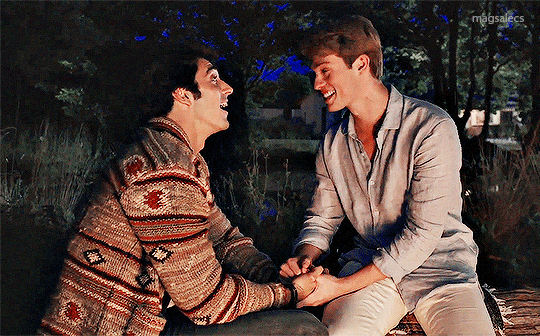
Shortly after having started an actual relationship with Henry, Alex plunges into his Texas campaign; he wants to use his influence as the president’s son to do good for other people. Henry’s philanthropic work and his overall influence inspire Alex to do more for his fellowmen, too.
When Henry panics and runs in the face of a declaration of love, Alex confronts him right away. Alex is willing to fight for his love. He „flies across an ocean and storms a f…ing palace“, in his words, to tell Henry he won’t give up on him.
As they say goodbye at the airport both gift one another what means most to them - ring and key. Alex until then never took his key chain off, not even when he was swimming or having sex. Alex’s last virtue is patience, yet he is willing to wait.
In the end the shy, introverted Henry says, “I will no longer be the prince of shame and secrets” finally confronting his worst fear, that his subjects may no longer like him.
Which is where we reach the bottom line.
„Real love“ is not defined by how deep, desperate and or romantic your feelings are.
Real love makes you a better, stronger and more mature person.
Red, White and Royal Blue is an actual, real and inspiring love story. Call Me by Your Name is a slap in the face.
#movie essay#rwrb#call me by your name#film analysis#relationships#same-sex#luca guadagnino#james ivory#thimothee chalamet#armie hammer#matthew lopez#casey mcquiston#taylor zakhar perez#nicholas galitzine#movie review#movie comparison#manipulation#narcissisim#dysfunctional relationship#cmbyn#psychology#romantic love#mental health#andré aciman#toxic relationship#romcom#red white and royal blue#emotional abuse#gay romance#firstprince
32 notes
·
View notes
Text
sunshine court no context
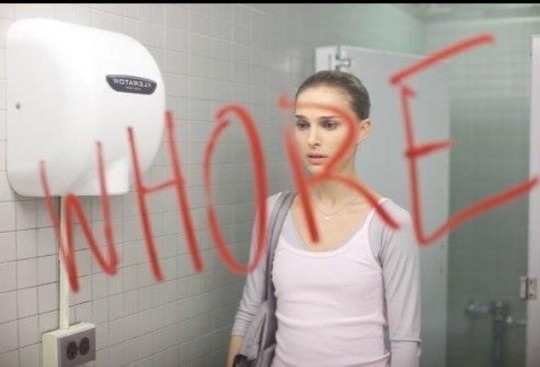
#i'm sorry... i couldnt stop thinking of this meme while reading the beginning#lemme find the line that really set it in for me... ok it was 'have fun whoring your way to the top of another line-up you useless bitch'#the raven hate mail game was insane#anyways yea i just spent like 3 hours straight reading tsc and yes i just finished it#the sunshine court#the sunshine court spoilers#all for the game#nora sakavic#also neil continuing the time-honored tradition of murdering rapists at the end of the book was iconic. king#i need to reread the og trilogy sighhhh the second book is a lil hard for me to get thru though#but i liked this one a ton. all the characters felt very real#i liked the choice to make the trojans not all sunshine and rainbows but have to make an effort to keep up that appearance#and also oml these bitches are worried about jean ruining their reputation when they have LUCAS on the lineup ? yall have bigger problems..#thats a joke i just think lucas is a bitch#i was also surprised by jean ending up pan vs jeremy just gay because the fandom characterization has always been the opposite#but yknow what i like it a lot#tempted to put a whole book review right in these tags but i won't#aftg //#tsc spoilers#tsc
18 notes
·
View notes
Text
“Life with Derek” is Back Again!

Life with Luca is a hour and a half spin-off movie based on the 2000’s Canadian Sitcom Life with Derek, set eighteen years after its predecessor. The story follows two step-siblings, Casey McDonald (Ashley Leggat), now a court lawyer and mother of three. And Derek Venturi (Michael Seater), now a successful musician in Paris and a single dad. As history repeats itself, they both have rebellious fourteen year old teenagers, pushing their buttons. So in order to get a break, they both have the idea of dropping them off with their grandparents for their anniversary, and to their surprise, they end up meeting each other instead. With help, they figure out how to co-parent their kids together for a weekend, and hijinks naturally ensue.
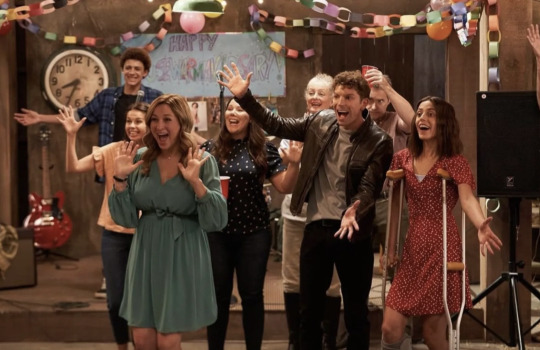
The original show Life with Derek was all about a blended family. In which two teenage step-siblings, Casey and Derek (the eldest children in the household and equally self absorbed), clash; fighting each other to take control of the house, their younger siblings, their school and their world.
The episodes consisted of simple, domestic family antics, containing smart jokes that would make adults and children alike laugh. The storylines were mature enough for teenagers to be interested but not so mature that it would put children off from watching.
Life with Derek was a show that prided itself in being character driven and more realistic than some of the family shows that was airing around that time, especially on networks such as Disney Channel.
However, it became well known and successful to this day for the slow burning subtextual “love affair” between the two step-siblings, Casey and Derek which undoubtedly acted as the backbone of the series. And the reason why it got picked up for a reboot fifteen years after the final episode aired.

When I first read the premise of Life with Luca (when the announcement came out that they were going to make a Life with Derek reboot in 2020), I was immediately judgemental as often reboots can erase character growth. It just seemed like another manufactured money making remake (a copy for the next generation) rather than an actual continuation of the original show.
And while the movie does have alot of tropes repeated from the original i.e. Casey and Derek’s kids Skyler and Luca clash from the beginning, two families not really knowing each other previously merging for the first time etc. The writers had the ability to make these tropes most importantly character driven and natural so the audience didn’t notice the similarities so much. And when they did, it’s treated as a familiar nod rather than a direct copy.
Luca and Skyler
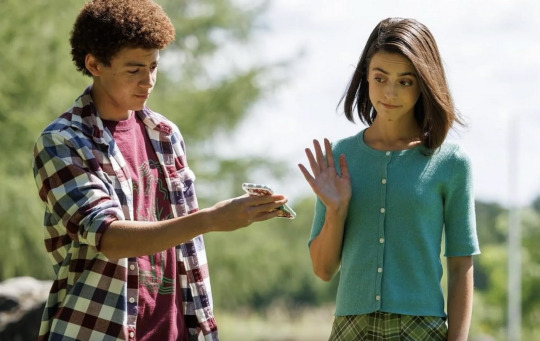
Part of the fun of the original was the ongoing romantic tension between Casey and Derek, and I was worried we were going to have a repeat of that with their kids, Luca and Skyler but thankfully the casting and writing department was alot more thorough. And while they do clash at the beginning, its presented more of a culture clash because of how they were raised, and it evolved into a familial relationship quite quickly. I loved watching their bonding moments.
They managed to keep the core message from the original ‘of family and building a family even when you hate your situation at the beginning’. I felt they did a good job of mirroring that message with Luca and Skyler.
Out of the two, I felt like Skyler was the more fleshed out. The casting for her was amazing, she looks just like Derek’s daughter. I loved how, even though she was clearly meant to be the ‘Casey character’ — organised and dramatic — she still had her own vibe. She had the carefree attitude and style from Derek’s parenting, but still was able to be responsible as she essentially raised herself.
Luca, (the ‘Derek’ character) the more rebellious counterpart, is suggested to be acting out due to his chaotic home life, rather than that’s just “how he is” unlike Derek who was labelled as the bad guy from the start. He’s still very much Casey’s son as he doesn’t have some of the toxic masculinity that Derek possessed in the original show. And he has a few neurotic tendencies from her style of parenting as well. But I almost feel we didn’t get enough of him.
If and when Life with Luca does get picked up as a TV Series later on, it would be nice to flesh out his character alot more (and hers), because there was clearly alot of conflict that the two of them both had, his dad working overseas and her mum having a bran new family, that can’t really be fleshed out thoroughly in a hour and a half film.
George and Nora
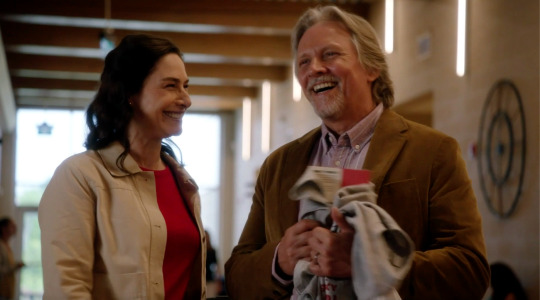
George and Nora’s plot was by far the most ridiculous (hint, jewel thief car chase), but I loved seeing them on screen again. It was nice to see how their relationship was still going strong after all this time. Along with their cameo, there were some other great ones such as Sam and Mr Lassiter. It was a shame we didn’t get to see the rest of the blended family such as Edwin and Lizzie and Marti, even for a second at the anniversary party at the end. But I understand the screenwriters wanted to save that for a TV Series later on, so they could be fully explored more.
Simon
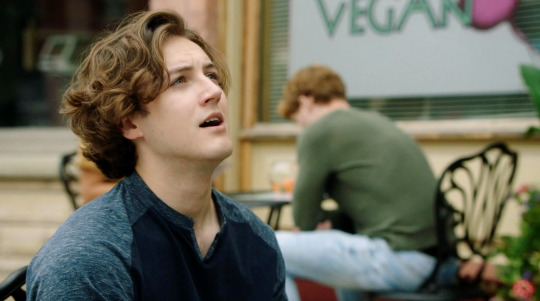
Simon, the youngest of the McDonald-Venturi’s (that was a storyline for the last two episodes of the original) was by far my favourite addition to the film. This was surprising, since that storyline in Life with Derek wasn’t exactly my favourite around the time of watching because I don’t necessarily agree that the step-family gaining a shared child made them “a proper family”. Thankfully, Life with Luca proved me wrong as he was so lovable. I loved how he was a perfect mix of both of the McDonalds and the Venturi’s, but mostly the Venturi’s as he was so clumsy.
Casey and Derek
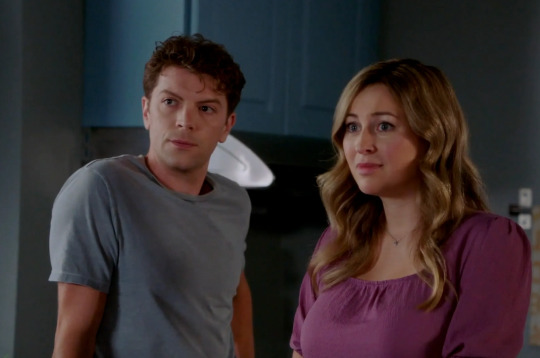
As always, the strongest parts of the movie, were when they were focusing on Casey and Derek, individually and together. I loved how they went with careers that naturally meshed with their personalities. Casey being a married lawyer in Toronto and Derek being a travelling musician in Paris with his daughter as a best friend. Watching Derek be a parent was amazing, especially since he was shown to be really good with kids in the original.
When the two finally meet up again, the audience can see that their friendship has definitely progressed; they have finally learnt to respect one another even though they haven’t spoken one on one for a long time. But they still maintained their comedic banter. It was refreshing to see that character growth. It was nice that it hadn’t backtracked in typical reboot fashion for the sake of drama/entertainment since that relationship was the core of why the original worked.
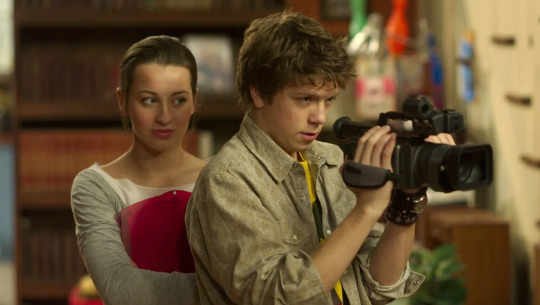
Now in the original show, Life with Derek, it was never confirmed that Casey and Derek had romantic feelings for each other, but there was alot of speculation by the fans, because of all the subtext going on throughout the series.
The actors, Michael Seater and Ashley Leggat, put a rest to some of the speculation in 2016 and confirmed in a article by MTV that because ‘the fans were so into Casey and Derek being a couple, [they] would find subtext in their lines to give the fans what they desire’
Life with Derek was primarily about the first four years that they [Casey and Derek] lived together. Their relationship mostly consisted of an antagonistic push and pull/tug of war even though at the end of the day, they were always there for each other when it really counted. Even though Casey and Derek claimed to dislike each other, it was very clear that the two had developed a deep bond over the course of the series.
However, Casey and Derek’s relationship in Life with Luca is interesting in a way that they’re no longer in a “sibling dynamic” in which they were previously forced into. Mostly because they’re no longer teenagers and the fact that they’ve barely interacted or lived together in eighteen years since life both took them in very different directions. Which creates a paradox in itself.
It’s this incredibly grey area throughout the movie where they’re adjusting to each other again, slipping into their old bickering, confiding in each other about parenthood, all while transitioning into a mum and dad dynamic while they’re co-parenting the children they had with other people.
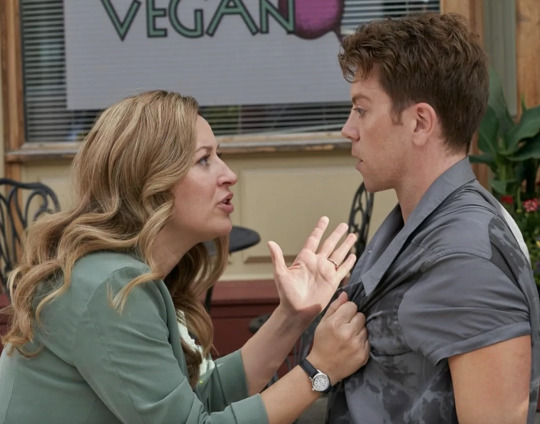
Before the movie came out, I was positive, because of the criticisms and hype surrounding the show and the pairing, that the writers were going to diminish the potential of a romance between the characters in fear of backlash. For example, have Casey in a happy marriage, Derek dating around and eventually gain a love interest at the end of the film. Also, trying to make their relationship as “Sibling- Esque” as possible.
Even though I knew from the premise of the reboot, that they were going to move in together, and there would be a few romantic undertones scattered in for the fans, I’d thought they’d play it off more as an “aunt and uncle babysitting the kids”.
But the opposite ended up happening. Casey has an absent husband who continuously leaves her and her kids alone while he plays hockey over seas — breaking his promises that he was going to retire before their kids were teenagers. Derek supposedly hasn’t dated anyone in fourteen years nor mentions flirting with other women. He even has a distant relationship with his daughters mum.

The moment Derek comes, he almost takes ‘the role of her husband’ as he sees Casey isn’t doing so well. He does the cooking for their kids — Casey even mentions that her husband does all the cooking while Derek is preparing dinner — babysits her little ones, attempts to calm Casey down when she’s getting too stressed, helps arrange an anniversary party for their parents so she’s able to get on with her work. And even though, they are referred as “Aunt” and “Uncle” in the movie, it’s also made apparent that they’re essentially “Mum and Dad” to their children as well.
One of Casey’s little ones, Molly even makes a “catch it or you’ll miss it” comment to Derek’s kid in one scene “I wish we were cousins AND sisters.”
Their last scene together at the end of the movie, Casey comes up to Derek saying ‘You’re gonna come home again soon, before the kids go to university?’ in which Derek heavily implies that he wants to move into her guest house to potentially raise their kids together, making a direct parallel to her husband not retiring from hockey and coming home from Europe, even after their kids grew up.
That moment is possibly why I came out from watching the movie thinking ‘If Casey and Derek don’t get together after this; then it’s bad writing’ because their scenes in the reboot didn’t feel like random “fanservice moments” like in the original; it felt like a genuine setup for a romance. Even if it can’t be written explicitly, due to the network, it is the most logical ending for their characters and the movie just made that ending seem even more inevitable.

Despite my enjoyment of Life with Luca, and overall it being a Great Comeback of a 2000’s Classic — it’s not a movie that can really work on its own. Finishing it left me feeling unsatisfied and wanting more. It felt very much like an introduction than a complete product. Its very apparent they made this movie so it could be picked up as a TV series later on, since there is alot of plot threads that are unexplored, unfinished or left open.
Life with Luca is not a reunion movie. It’s only page one.
“Life with Derek” is Back Again! by Ellie Hersey
#life with luca#review#lwl#dasey#derek x casey#article#life with derek#lwd#derek venturi#ashley leggat#michael seater#creative writing#writing#tv show#film#casey x derek#casey mcdonald#tv show review#filmmaking#film review#family channel#disney channel#disney
68 notes
·
View notes
Text
Ranking The Stranger Things Tie-Ins:
Now that I've finished the reviews (for the time being), I wanted to do a ranking of all the tie-in comics, graphic novels, and books. Originally, I was just going to do a Top 5 Best and Worst List, but I figured it would be more fun to make a complete list of all the tie-ins while also giving my brief thoughts on each one (especially for those who don't want to read my lengthy reviews). Please note this is all in good fun and just my personal opinion, which can be subjected to change.
Also, this list will NOT include any of the show's episodes, video games, tabletop games, children's tie-in books, the Choose Your Own Adventure book, the Stranger Things Experience, or the stage play The First Shadow.
With that out of the way, let's begin in order from Worst to Best:
#26: Stranger Things Summer Special (See Review Here)
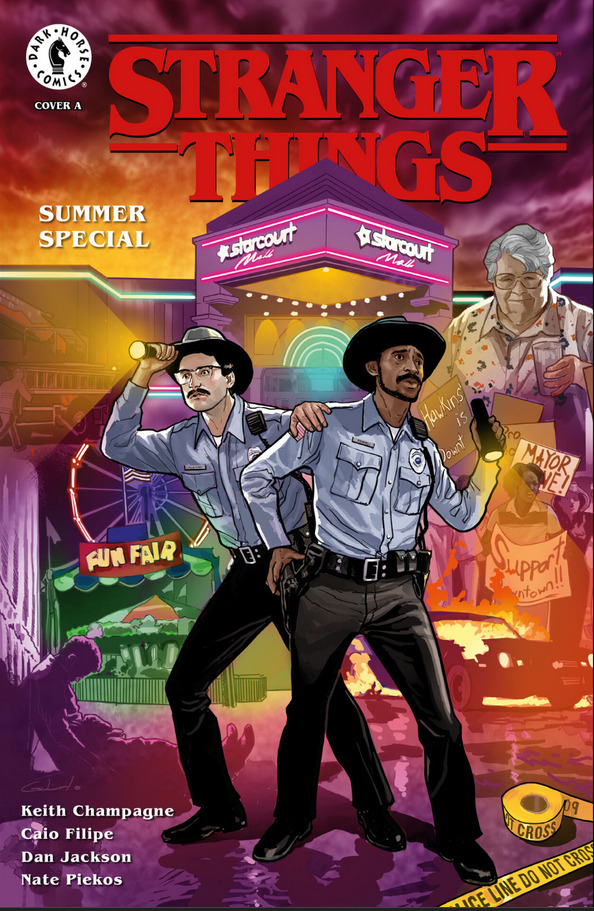
I never cared for Powell and Callahan as characters. They barely have anything to do with the show's main arc, they're NOT funny, and the "bumbling cop" trope is something I've grown tired of in recent years.
The premise of this short, where both of them are conveniently present at key events during season 3 in their lousy pursuit of being "good cops," all the while having constant near-misses with the Upside Down, the Flayed, and the Meat Flayer, is a repetitive joke that quickly grows old. That's not even getting into the huge continuity errors plaguing the short and creating a bunch of plot-holes. Completely unnecessary. Hard pass.
#25: Stranger Things The Bully (See Review Here)
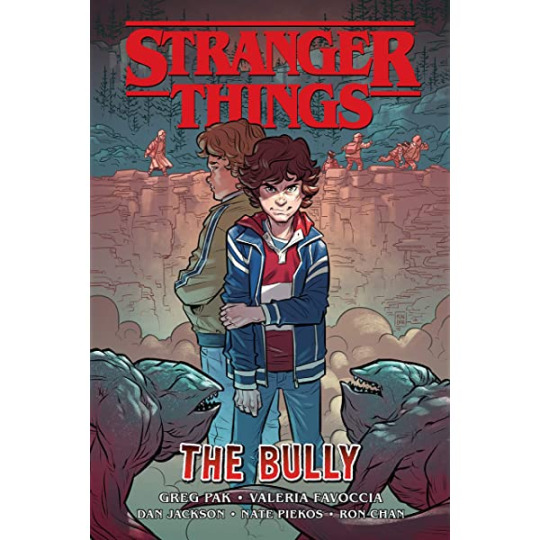
This only ranks slightly higher than Summer Special because I like the artwork better, and it doesn't mess up the show's continuity like the previous comic did. However, that's all this really has going for it.
For whatever reason, they decided to make an entire graphic novel focusing on Troy and James (the bullies from season 1), and all I could think about while reading it is "This is a huge waste of time." I already didn't like Troy to begin with, this comic does NOTHING to improve my opinion of him, and considering that neither James nor Troy have appeared on the show since (and probably aren't coming back for season 5), I don't see what the point of this story was. This paragraph from my review sums it up best:
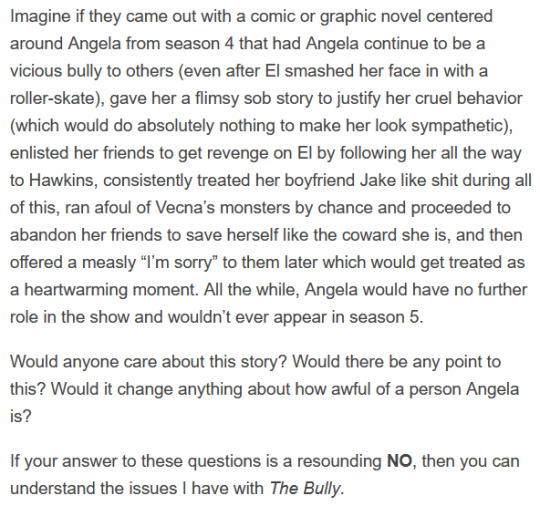
#24: Stranger Things x TMNT Crossover (See Review Here)

I'm sure there are fans who enjoyed this bizarre trip while embracing its absurdness and surrealism, but I am not one of them. I like TMNT and I like Stranger Things, but I draw the line at saying both properties exist in the same universe. That's not even getting into the haphazard attempts by the writers to make this comic canon with the show. Knowing the Duffer Brothers, that's likely not going to happen.
#23: Stranger Things Tales From Hawkins (See Review Here)
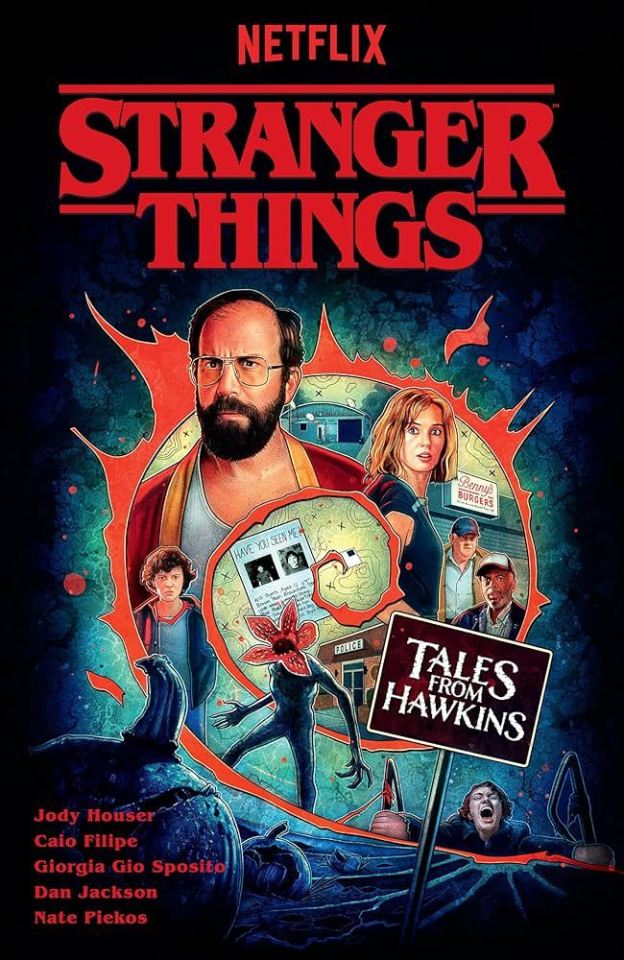
The idea of doing an anthology comic focusing on Hawkins residents was intriguing, but the end result was disappointing. They should have broadened their horizons regarding which characters to focus on, and not just set the stories exclusively in the first 2 seasons.
Murray's story (Issue #2) and the Pumpkin Patch Rivalry (Issue #4) are arguably the best ones. The rest are either forgettable or derivative.
#22: Stranger Things Six (See Review Here)
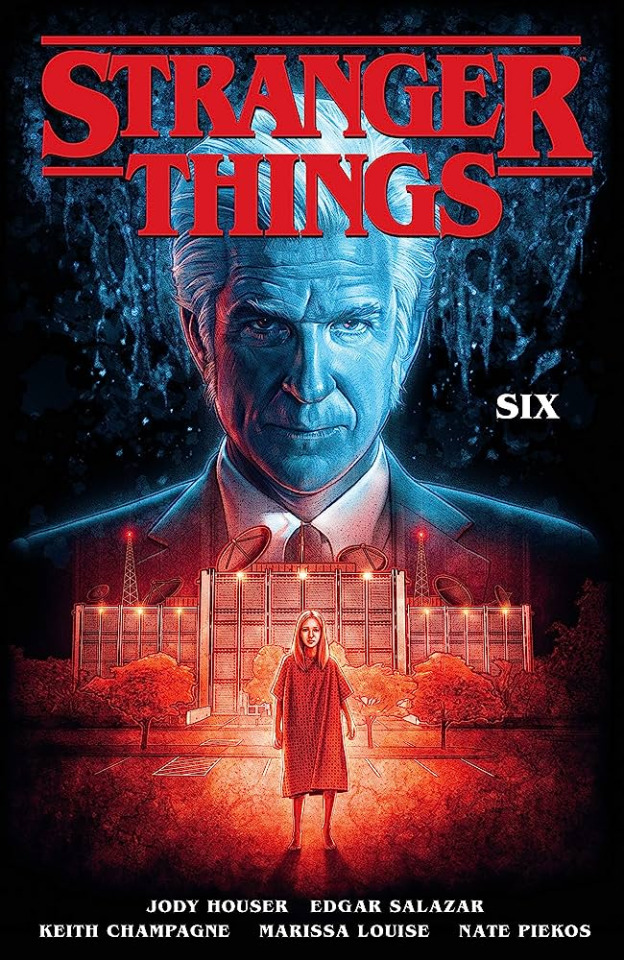
My first venture into Stranger Things comics. I've come a long way since then! :)
I remember looking forward to this particular comic to learn more about Hawkins Lab, Dr. Brenner, Project MKUltra, and the special kids............only to feel underwhelmed when I actually read it. I wanted to like Francine/Six, but I didn't find her interesting or compelling as a character, and the attempts to include other aspects of the show's lore (i.e. The Upside Down, Terry Ives, El and Kali, etc) felt shoehorned. Combined with the direction season 4 went, and it's a safe bet to say this comic is NOT canon (if it ever was).
#21: Stranger Things Suspicious Minds (See Review Here)
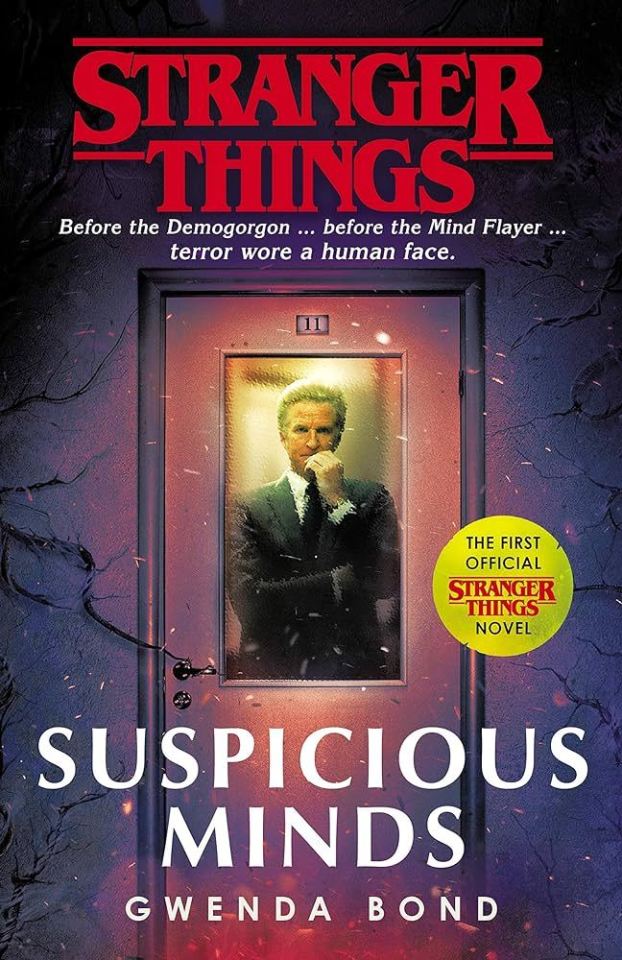
Suspicious Minds ranks slightly higher that Six for doing a better job fleshing out the experiments that were taking place at Hawkins Lab, as well as giving more details about Kali, Terry Ives, the test subjects, and El's biological father Andrew. It helps that Brenner is a threatening presence in this book, and that the narrative excels in maintaining suspense.
However, similar to Six, the events of season 4 render most of this book non-canon. That's not even getting into a major continuity error regarding El's date of birth that sticks out like a sore thumb.
Suspicious Minds serves as a cautionary reminder that if you're a creator and you've planned out a major twist for your show, then you either need to have a direct hands-on approach to how tie-ins are written and approved, or you need to be willing to share that twist with those you've hired to write tie-ins for the universe you're managing.
In any case, it is PAINFULLY CLEAR the Duffer Brothers didn't share information about Henry/One/Vecna with Gwenda Bond when she worte this book (or Paul Dichter for that matter when he helped oversee its development), and boy does it show in the final product. 😖
#20: Stranger Things Kamchatka (See Review Here)
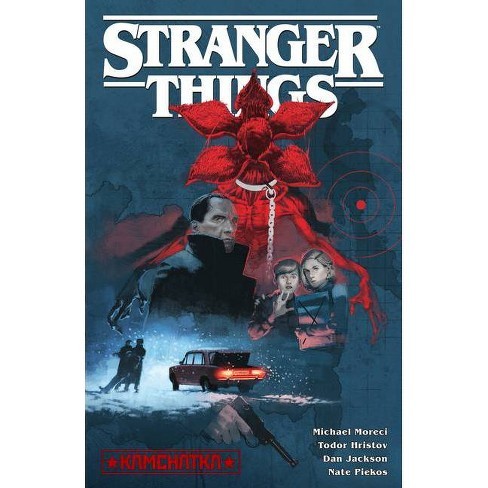
Another example of a comic where the premise sounds intriguing, but they squander it on characters who aren't going to play a role on the show while also giving very little (and in some cases, contradictory) information about the show's lore.
While I liked the darker tone, the Cold War setting, and the spy thriller aspects, the characters didn't do much to impress me, and I was also frustrated by the lack of canon characters (Hopper, Dmitiri, Yuri, etc) who could have been in this comic and weren't. It's not bad, but it is mediocre when it didn't need to be.
#19: Stranger Things Into The Fire (See Review Here)
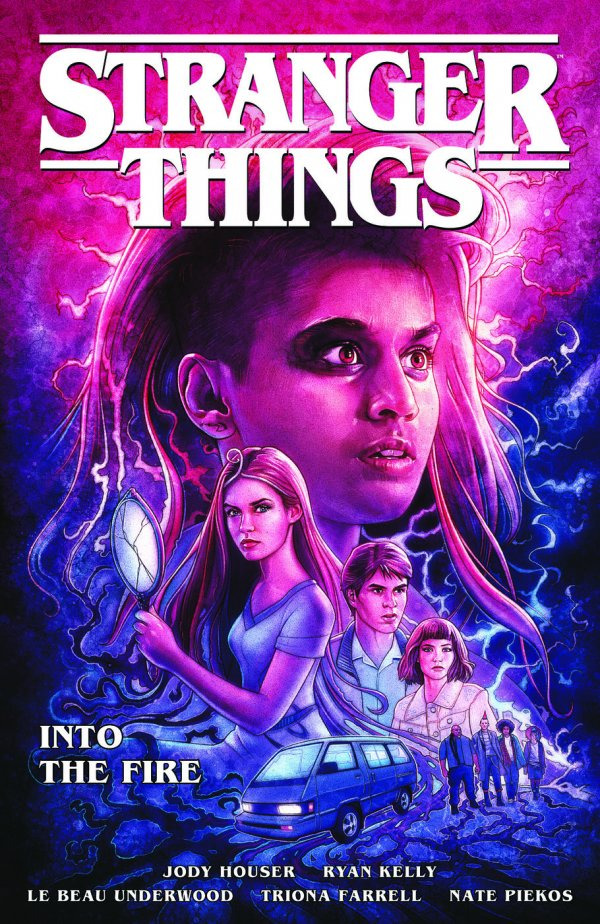
A sequel that improves on its predecessor (Stranger Things Six). While the comic likely isn't canon for the same reasons Six isn't, I appreciated the personal stakes this time around, I loved the creepy gothic aesthetic they did with Jamie/Nine's hallucinations, and it was nice to see Kali utilized in this story in a meaningful way. Here's hoping the Duffer Brothers wise up and bring Kali back for season 5 because she deserves so much better!
#18: Stranger Things Creature Feature (See Review Here)
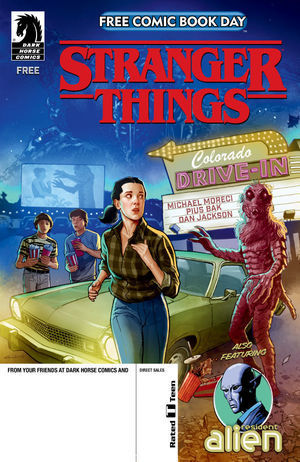
One aspect of Season 4 that was disappointing was how little we got to see of the family dynamic with El and the Byers once they moved. It's hinted at, but not explored deeply. Creature Feature dives a little more into that, as well as El's struggles with PTSD, and gives a nice heartwarming scene between El, Jonathan, and Will towards the end that makes the short stand out.
However, the one-shot comic is sadly brief, and it may leave people frustrated about why they didn't go for a longer comic/graphic novel about El and the Byers adjusting to life in Lenora. I would've been interested in seeing that!
#17: Stranger Things The Game Master (See Review Here)

A one-shot comic where we get to see Steve and Nancy back together after the events of season 1 while also getting a surprisingly sweet interaction between Steve and Mike that isn't them griping with one another. I don't care much for Steve and Nancy's relationship, but I did like their attempts to help Mike feel better after El's apparent death. That was enough to elevate this short.
#16: Stranger Things Erica's Quest (See Review Here)
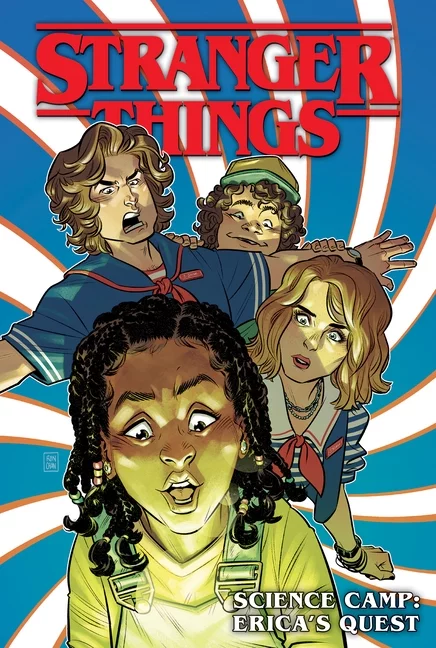
Not a fan of the artwork, but I was happy to witness the Scoop's Troop back together again. I also love how this short confirms Steve has played D&D before, which gives context to that scene in S4 when Dustin calls Steve asking him to be a substitute player in Eddie's D&D campaign.
#15: Stranger Things The Voyage (See Review Here)

Major improvement on Stranger Things Kamchatka. It's highly doubtful the show will include any mention of this comic (though if the Duffer Brothers decide to bring back the Russian arc for S5, I hope they incorporate Dr. Karine as the main antagonist), but the story is scary, suspenseful, and has the kind of gruesomeness you'd expect from an R-Rated horror film.
#14: Stranger Things Darkness On The Edge Of Town (See Reviews Here)
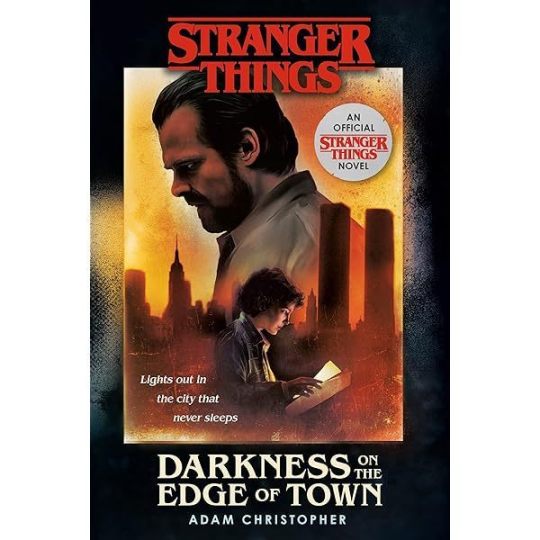
Having grown up reading a lot of murder mysteries, I have a soft spot for the genre. Hearing that Hopper's backstory involved him tracking down a deranged serial killer in New York City back in the 70s while also dealing with a dangerous cult was enough to get me on board with this book.
This novel isn't perfect, but it makes up for its shortcomings in creative ways. Hopper's backstory with the NYPD is fascinating, the story's focus on issues related to poverty, crime, mental health, law enforcement, and societal woes works well (even if they drop the ball towards the end), Hopper's interactions with El in the present are a highlight, and the narrative is effective in keeping the reader invested.
#13: Stranger Things Erica The Great (See Review Here)
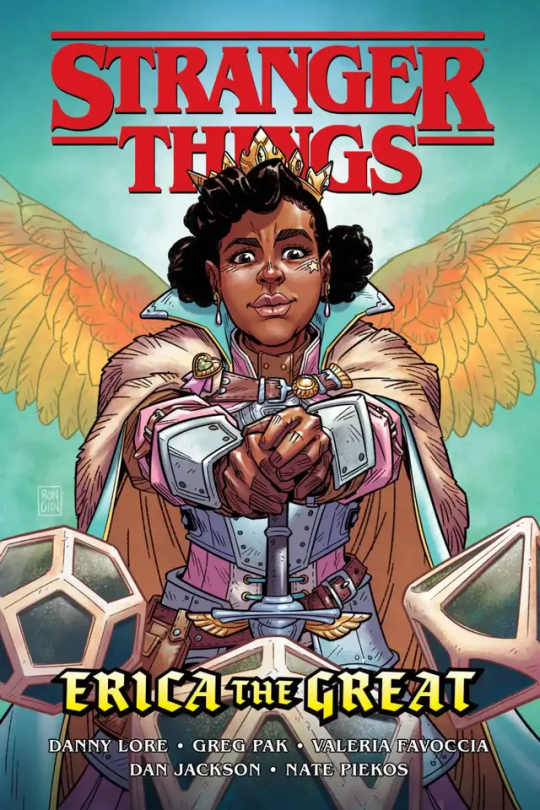
A light-hearted graphic novel that bridges Erica's arc between seasons 3 and 4 while expanding on her growth as a character and development as a D&D play. It was cool seeing Erica's friends get their day in the limelight (one of whom might be making an appearance in S5), and the story has enough funny moments to keep the reader entertained.
#12: Stranger Things Flight Of Icarus (See Review Here)
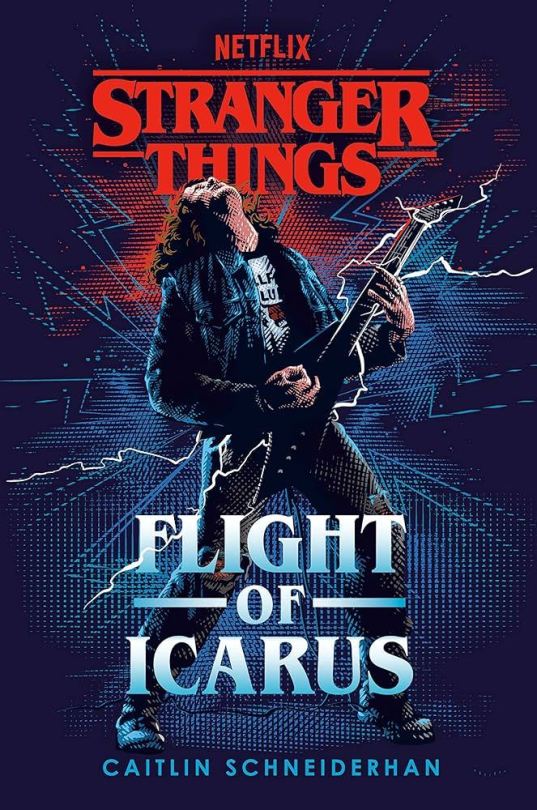
I know fan reaction towards this book was cold when it was first announced, and I'll admit parts of it were hard to read given we all know how Eddie's story ends. I'm not a fan of media that teases false hope to the audience, only to cruelly yank it away.
That being said, I will go to bat for this book: It's well-written, and does a good job expanding on Eddie's character and his relationships with others (Wayne, Al Munson, Jason, etc). I also appreciate the book's themes regarding "forced conformity," and its scathing criticisms towards individuals and institutions (school teachers, law enforcement, students, residents, etc) who scapegoat and punish people like Eddie for existing while allowing (or in some cases, enabling) truly vile people to get away with being vicious and cruel towards "acceptable targets."
Considering how certain individuals on Tumblr and varying social media platforms have been treating others for the past few months, this book couldn't have come during a more relevant time.
#11: Stranger Things Halloween Special (See Review Here)
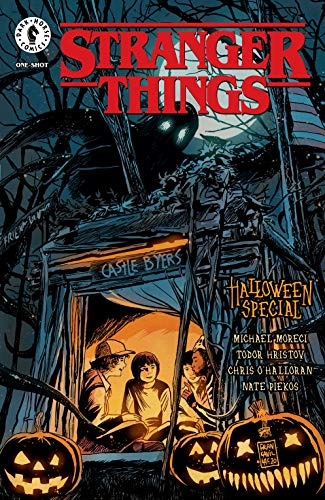
A delightful Halloween comic taking place before season 1 which centers around the Party telling an urban legend about the Child Eater of Hawkins, which coincidentally has eerie parallels to Vecna. Creepy artwork, an unsettling atmosphere, and a fun twist at the end! :)
#10: Stranger Things Hawkins Horrors (See Review Here)
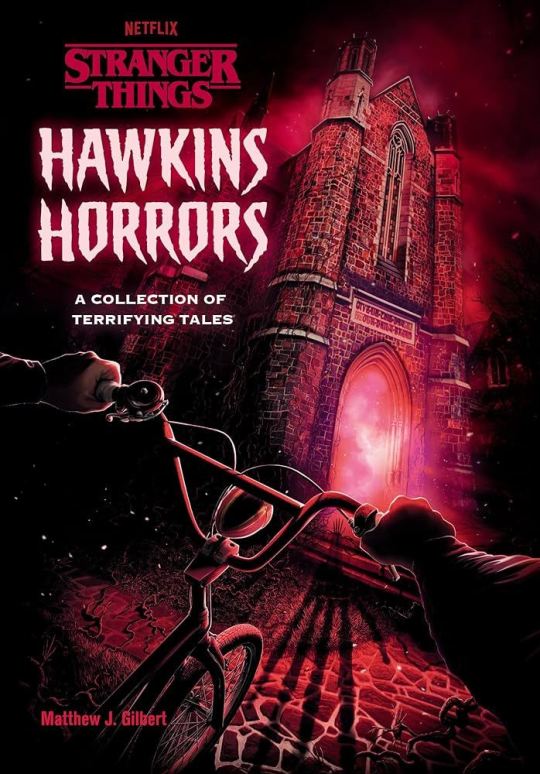
Same deal as the Halloween Special, except it takes place between Seasons 3 and 4, and features multiple horror stories told by Steve, Robin, Nancy, Max, Lucas, Erica, Dustin, and Mike while they're all trapped in the Video Store during a power outage. The stories are scary and reminiscent of horror anthologies like Tales from the Crypt and Goosebumps, and some of them even cheekily foreshadow certain events that occur in season 4.
#9: Stranger Things Runaway Max (See Reviews Here)

Like Flight of Icarus, this book is hard to read, albeit for a different reason: I don't enjoy stories with characters trapped in abusive situations, and this book does not pull its punches in depicting the utter hell Max suffered through living with both Neil and Billy.
That being said, I grew to have a new appreciation for Max's character because of this book, and I liked seeing her backstory, her perspective on the events of season 2, and her thoughts about the characters she interacts with. I loved seeing her relationship with Lucas develop, I liked her brief interactions with Steve, and there was a satisfying payoff in her standing up to Billy and finally regaining some control over her life. If you love Max's character, this book is for you!
#8: Stranger Things Winter Special (See Review Here)
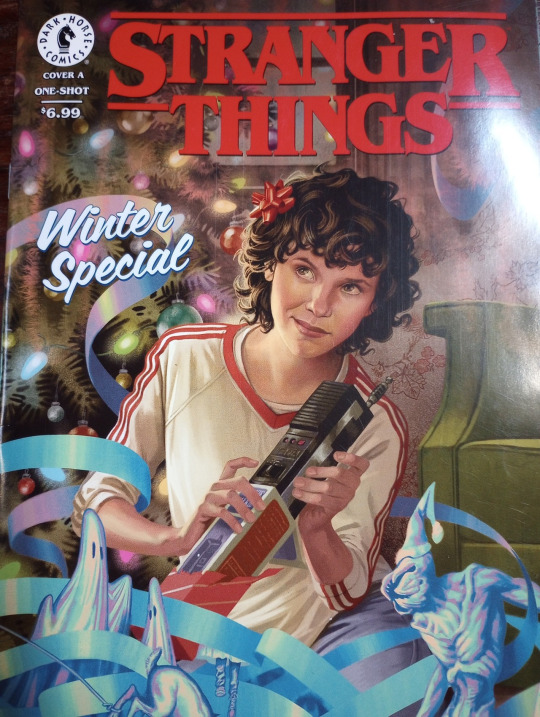
The closest Stranger Things will ever have for a Christmas Special (not counting the endings of the first two season finales). So many little details (i.e. the way the Party explains different Christmas stories to El and how she visualizes them, the revelation about what happened to the demodog in Joyce's fridge, etc) that make this an enjoyable read.
#7: Stranger Things Lucas On The Line (See Review Here)
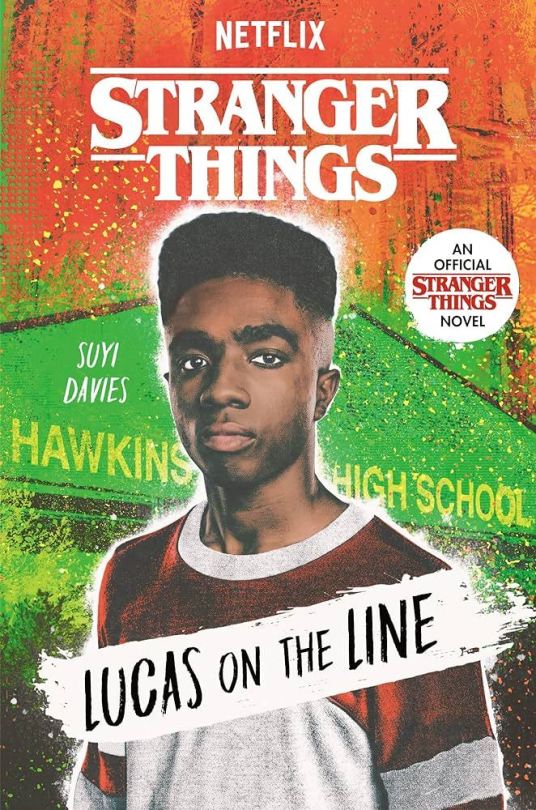
One thing I will say for the tie-ins is that I appreciate how they expand the perspectives of characters from the show. Such is the case with Lucas on the Line. It takes place between seasons 3 and 4, and explores Lucas's attempts to come to terms with his trauma, the growing rift between himself and Max, his attempts to balance his strained relationships with his friends and his desire to play basketball and break out of the "nerd" stereotype, and it gives a very brutal but effective portrait of what it's like for Lucas to be one of the few black kids in Hawkins constantly surrounded by people who are either outwardly racist or project their biases and prejudices in truly insidious ways.
There are two reasons I'm not ranking this novel as highly even though it's a fan-favorite: 1.) There are continuity errors that took me out of certain moments while reading it, and 2.) The third act (which is when S4 begins) does a clumsy job tying in with the rest of the book and its themes. I really wish the book had continued with Lucas's story up to the end of S4 instead of stopping halfway through.
#6: Stranger Things The Other Side (See Review Here)
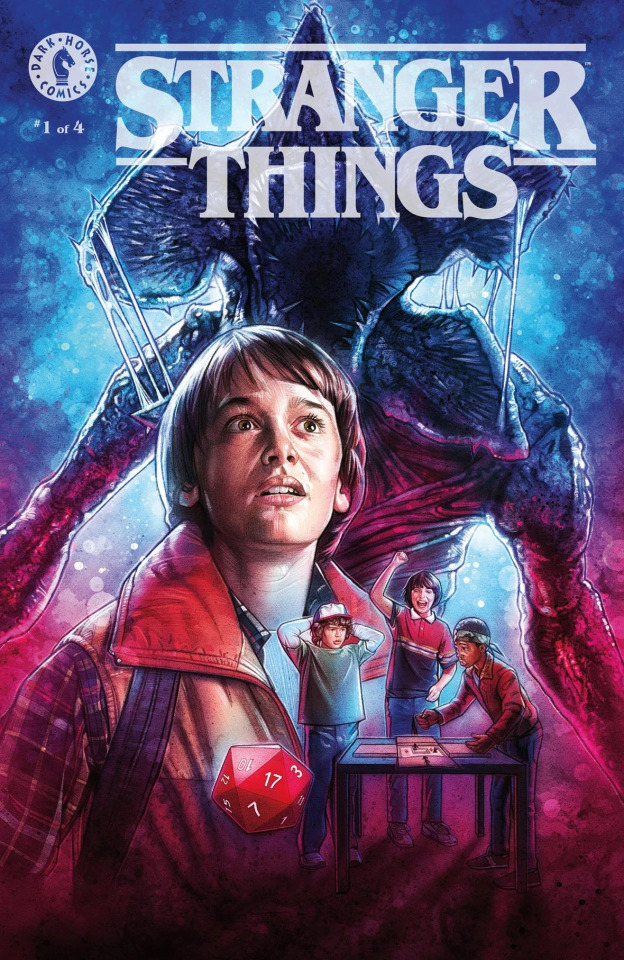
I always wanted to know what was going on with Will in season 1 when he was taken to the Upside Down. This comic thankfully elaborates on that and doesn't disappoint. Will's journey to survive is both intense and terrifying, and the way the comic seamlessly connects itself with the events of season 1 is to be applauded.
I have no clue what the Duffer Brothers plan to reveal in season 5 about the Upside Down and why time froze in 1983 when Will was taken, but considering they talked with the writers and artists for this comic and gave their stamp of approval, I'm hopeful the events of The Other Side won't be retconned.
#5: Stranger Things Science Camp (See Review Here)
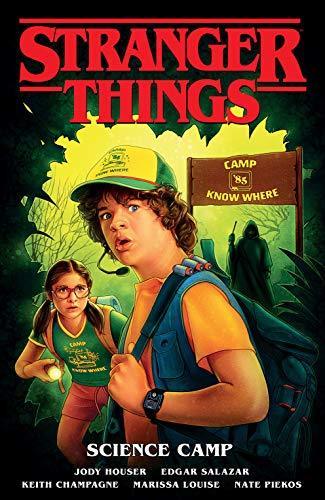
Who knew that when Dustin went to Science Camp, he walked right into a Friday the 13th movie? 😂
Don't want to spoil too much about this one, but I had a blast reading it. Dustin's perspective is always entertaining, the comic works as a brilliant introduction for Suzie, and the mystery plaguing the camp is genuinely interesting and has a good twist. High recommendation.
#4: Stranger Things Zombie Boys (See Review Here)
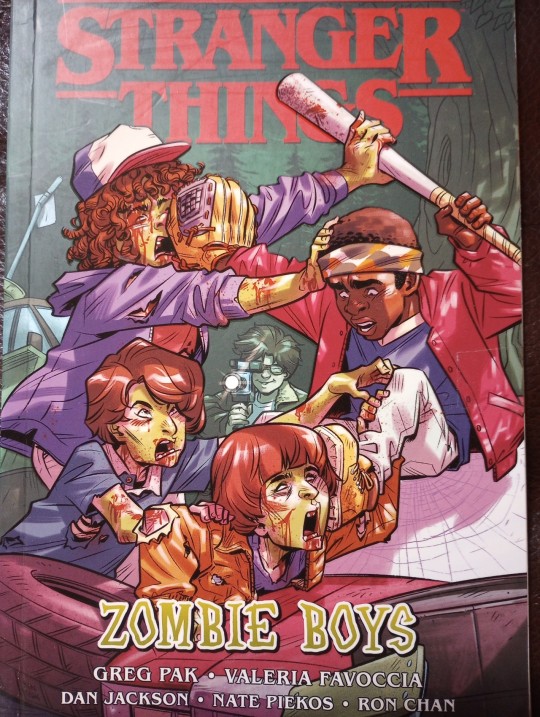
I'm still bitter that the character of Joey Kim never made an appearance on the show despite the camaraderie he had with the Party, as well as how he gave the boys some catharsis from all the shit they were put through in season 1.
Nevertheless, I enjoyed the premise of the Party making a zombie movie, and I appreciated how it handled the characters' trauma without being patronizing. The artwork was also impressive and beautiful to look at. Here's hoping we get more comics and graphic novels like this in the future!
#3: Stranger Things Tomb Of Ybwen (See Review Here)
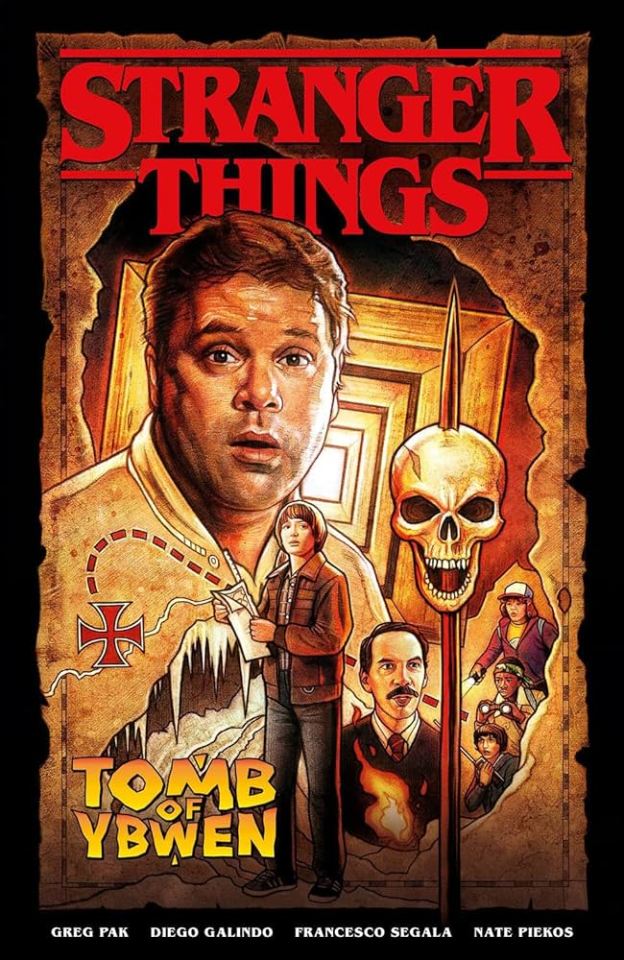
At its core, the comic manages to explore an aspect that wasn't given much coverage on the show: Will's reaction to Bob's death and his attempts to come to terms with it. All of which culminates in a quest Will undertakes when he finds a map from Bob that (allegedly) leads to an ancient Viking treasure buried in Hawkins.
I don't want to give too much away in terms of spoilers, but the story is both emotional, sad, and heartwarming, and it does an excellent job reinforcing the friendship between all 4 boys while also demonstrating the impact Bob had on Will's life.
#2: Stranger Things and Dungeons and Dragons (See Review Here)
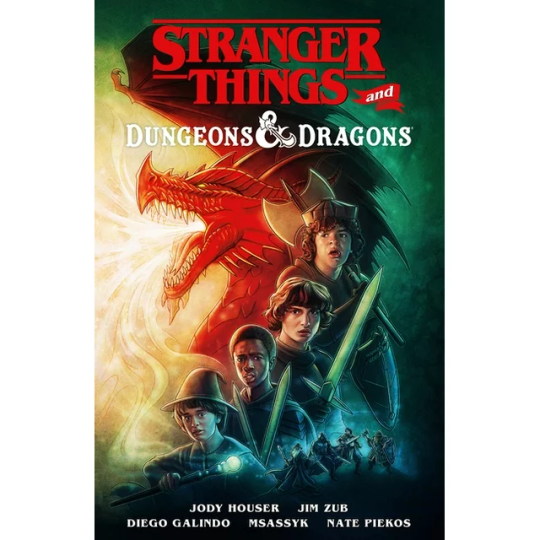
Speaking as someone who's occasionally crafted various fantasy scenarios in my head to cope with the stresses of life, this comic was deeply relatable. The show never shied away from emphasizing the importance of D&D to these characters, and this comic expands on that by illustrating why they became interested in D&D in the first place, how they've used D&D to cope with living in Hawkins, how the events of the first 3 seasons factor into how they play D&D, and how the game evolved with them as they continued to get older. It's like the piece of media from your childhood that stays with you as an adult. Arguably the best comic in the series (so far).
#1: Stranger Things Rebel Robin (See Reviews Here)

My favorite book and tie-in of the series. Speaking as someone who's gay, this story spoke to me on a personal level, and there were a lot of parallels I was drawing between Robin's experiences in high school and my own: The fear of being outed and ostracized. The desire to break free and explore the world. Recognizing the injustices that exist in society and wishing you could do something about them. Getting a nasty dose of reality that people you thought you could trust aren't reliable, and may even be more awful than you anticipated. Been there, done that, still dealing with some aspects of it.
It's funny because even if you take out the plot elements relating to the Upside Down, you still get a great coming-of-age story, and one that speaks to many people, LGBT+ or otherwise.
That concludes the ranking and reviews for right now! Thank you again for those who've been reading them! :)
#stranger things#tgh opinions#tgh reviews#stranger things comics#stranger things tie-in novels#mike wheeler#will byers#dustin henderson#lucas sinclair#el hopper#max mayfield#steve harrington#robin buckley#jonathan byers#nancy wheeler#erica sinclair#eddie munson#kali prasad#bob newby#jim hopper#joyce byers#murray bauman#the duffer brothers#ross duffer#matt duffer
15 notes
·
View notes
Text
I Read The First Volume Of The Case Study of Vanitas And Here's A Review Of It
You know when an anime adaptation is great that they basically animate the first three episodes from the first volume without any major changes. Yes, the anime was great, one of my absolute favorites, but the manga is a whole other magical experience. To be honest, my review for the first volume will be short because there’s not much to talk about since it’s identical to the first three and a half episodes. All my theories will probably in a later volume that doesn’t follow the anime.
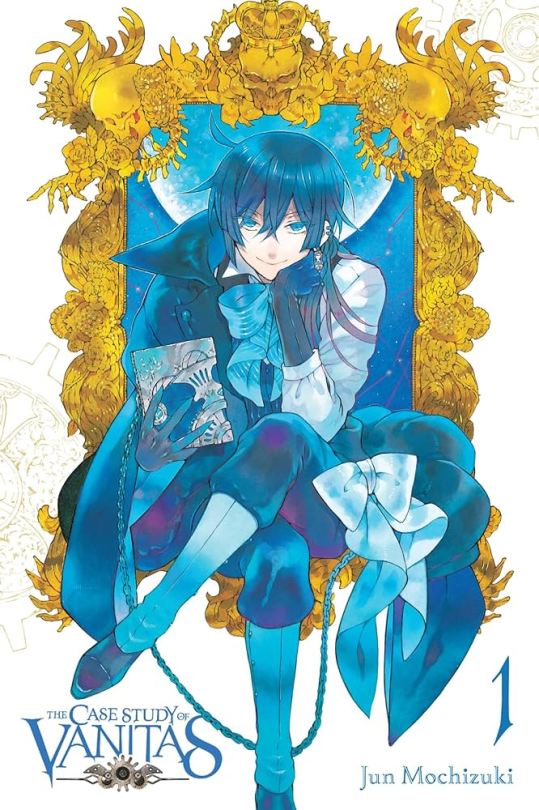
To give a run down of the story, it’s about Noe, a vampire, traveling to Paris as he heard word of a mysterious grimoire called the Book of Vanitas being sighted there. When a vampire woman goes on a rampage due to a curse, a young human man calling himself Vanitas steps up and vows to treat her for he is a vampire doctor who possesses the Book of Vanitas and is the only one who can activate it. When his abilities are shown to Noe for the first time, Noe and Vanitas goes on many misadventures to cure vampires from their curses.
Mochizuki’s art is beautiful. I especially loved the airship scene and the scene where Noe and Vanitas were falling off and looking at the moon. She really amped up with the designs compared to Pandora Hearts. I love Pandora Hearts, but The Case Study of Vanitas’s character designs really stand out. Vanitas and Noe are my favorites! However, what Mochizuki has improved the most is the comedic faces. Boy, the funny faces she draws for the characters are HILARIOUS.
I guess the only difference from this volume and the first three episodes is noticeable in episode 1. In the first episode, the story of Vanitas of the Blue Moon was introduced in the beginning, while it was introduced in the middle of the chapter in the manga. That’s the only major difference I noticed. Other than that, the anime did a great job with the pacing and making Mochizuki’s art be even more beautiful in animated form. If you’re curious about the anime, I have my reviews of the anime on my blog—you can click here to read the first two episode reviews as the third episode does have Volume 2 content in it.
My favorite character is and will always be Vanitas as he’s an annoying gremlin with something to hide and I like that aspect of him! He’s a very unique protagonist who isn’t afraid of being a jerk. Though, since this story is told through Noe’s eyes, the jerk aspect could be amped up out of bias.
All I wonder is how long the story will be because it is a recollection of Noe’s memories of Vanitas as he did kill him some time after the first episode. The mystery behind Vanitas’s demise is probably the biggest one of the story. Since Mochizuki is the queen of plot twists, I am expecting a very shocking reveal.
Also, the cutest thing about the first volume is that Hiromu Arakawa, the author of Fullmetal Alchemist, wrote a little comment for Mochizuki that can be seen behind the cover when you open the book! Arakawa is one of Mochizuki’s influences, so I’m sure she was thrilled!
Because I am a biased Mochizuki fangirl, this is a 5-star read like the four Pandora Hearts volumes I reviewed. Do I recommend this? Absolutely. My one goal in life is to collect everything Mochizuki has written and make a bookshelf section dedicated to her works. Also, bookstores, why do you never have volume 2 in stock! Wherever I go, Volume 2 is never in stock! What is your thought on the Vanitas manga?
#the case study of vanitas#vanitas no shuki#vanitas no carte#vanitas#noe archiviste#jeanne#Luca oriflamme#murr#review#manga#manga review#jun mochizuki#ecargmura#arum journal
14 notes
·
View notes
Text
youtube
#youtube#redlettermedia#red letter media#rich evans#jay bauman#gorilla interrupted#half in the bag#mike stoklasa#best of the worst#jack packard#star war#starwars#star wars#andor#star wars andor#laugh#improv#jedi#jedi survivor#jedi oc#yoda#master yoda#baby yoda#the mandalorian#george lucas#urban outfitters#riddle#john waters#movie review#batman
10 notes
·
View notes
Text

Watching Luca (2021) in movie theaters, 3 years after its initial release really invoked something in me.
When I was originally into the movie, it was a year after quarantine and so many shifts and changes were happening not only in my life, but in the world. This movie was there for me, and so was the fandom and the friends I made through it.
Now, I’m 18 and graduating school which felt like it was eons away when I was a huge fan of this movie.
I had forgotten some moments that still caught me by surprise years later. It was refreshing to meet these characters that held such importance to me once again after so many years in an empty movie theater. I think past me would’ve paid attention to every line, every motion, eye movement, and other details during the movie and made some tweet freaking out about it.
Now I get to have the pleasure to watch it for what it is, a kids movie.
The movie presents such a simple theme, exploring the unknown in life. The characters explore life on the surface, having never experienced anything of the sorts. It made me realize how much I had been taking for granted in life. Walking with the ground underneath my feet, tasting my favorite foods, learning about how the Earth spins, and having a family who supports my aspirations. I will now have a reminder in the back of my mind every time I find myself enjoying the simple aspects of life to not take them for granted.
However, another seemingly “simple” theme Luca presents is the theme of friendship. Luca Paguro only has two friends during this entire film, yet so much conflict emerges from this. What seems to be a simple task, to have one friend by your side, proves to be difficult even for kids. Luca and Alberto fight about what they want to get out of life, and conclude that it is impossible to be friends when you are too different from each other.
Surprisingly, the aftermath of the fight did not move me to tears or sadden me. (Don’t get me wrong, my jaw was open when Luca called Alberto a sea monster) I could relate to these kids, sometimes it’s hard to be friends with people who think too differently from you. I could find parts of myself in their positions countless times throughout my life. I would be like Luca, trying to physically do actions to ignite an alliance again. Or on the other hand, I’d be Alberto and blame myself for everything and not attempt to make amends by isolating myself.
Yet, the part that really moved me was when Alberto went back for Luca, who was pushing through the race to prove his loyalty to Alberto. Despite their several disputes, they’re still on each other’s sides. Despite their differences, they still love each other so much to the extent they’d endanger themselves for each other. Despite everything, they still would do anything for one another.
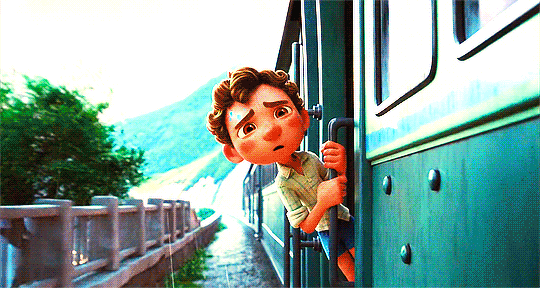
And as displayed in this dramatic gif above, they’d even leave each other for the other to be happy. It is clear throughout the movie Alberto has trouble detaching from Luca and has gone through a very dramatic event in his life regarding his dad abandoning him. Yet in the span of what I’m assuming is two weeks, Alberto meets Luca and his world is changed. He grows as a person, and learns to let the people he loves move away from him.
While one could argue Giulia’s dad is now Alberto’s new father, I’d still like to think Luca had such an affect on Alberto that he helped heal Alberto. This kid he just met had such a hold on him, he learned to be better because of his love for him.
The movie ends with a bittersweet finale. Luca moves away to the big city, attending school with his new friend Giulia to nourish his curiosity and new found love for learning. Alberto stays with Giulia’s dad in Portorosso, becoming a fisherman with him and enjoying the new routine to his life. They live separate lives without each other being there, but still find ways to include each other in their routines. They write letters, describe their new discoveries, and send gifts to each other. They find happiness in this settlement and anticipate the next time they can see each other.
When I left the movie theater and stood waiting for my ride outside in the wind, I felt like a hole had just opened in my chest.
I watched the branches and leaves shake in the wind, just like they did in the movie. I watched people walk by just like they did in the movie. Yet, there was some sort of feeling of envy in me.
I understood the movie’s themes, I understood I should be grateful, I understood it’s hard to navigate relationships. Yet, I was so jealous of these fictional characters getting to walk away with people who loved them so deeply. Something as simple as getting a rusty bike for their friend after winning a kid’s race made me feel so envious. I wanted the chance to prove my love for someone like that or to be the one receiving such admiration.
The last time I watched this movie being 3 years ago, nothing has changed between then and now. I still haven’t found my Luca or Alberto.
And I know, it sounds like I have no friends or I’m not thankful for them. I do have friends and I am extremely grateful for them, but it’s only once in a lifetime are you going to find someone who connects with you as much as those two did. Someone who heals you the way those two did. Someone who stays by your side, no matter your differences ,the way those two did. I’d hate to rush something like that, but I’ve been waiting for the past 3 years for someone to see me the way they saw each other.
Of course, the whole gay-sea monster identity parallel definitely comes into play here. But instead of having someone there to love your identity and understand you, it feels like I’m wanted dead for $300,000 dollars for who I am, like they were at the start of the movie. And also, the city’s population is the population of America.
Although I have been dragging my old age through out this sad movie review/diary entry, I am 18! I am graduating! I will be able to explore a new and different surface above the water that is college without anyone knowing my real identity. I’ll discover new things about the world and myself without anyone holding me back.
Though, I know I cannot rush these things and I won’t find my person the first day of college. I’ll have to wait patiently and trust that destiny connects me with the person I need at the time I’ll need them most.
However, a part of me hopes that one day, I’ll be able watch this movie with my own Luca or Alberto by my side.
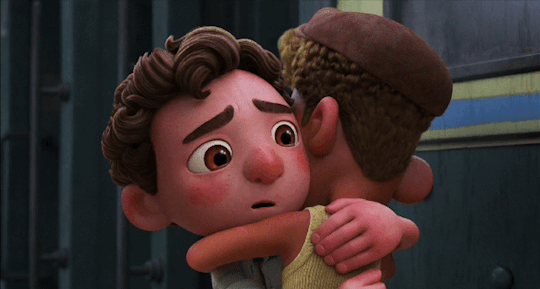
OVERALL? GREAT MOVIE! 10/10 I LOVE GAY PEOPLE!
#luca#pixar luca#luca 2021#such a beautiful movie#movie review#thank you if you read the whole thing#this is pratically a diary entry#the queer experience#god needs to hurry up with his timing…
17 notes
·
View notes
Text
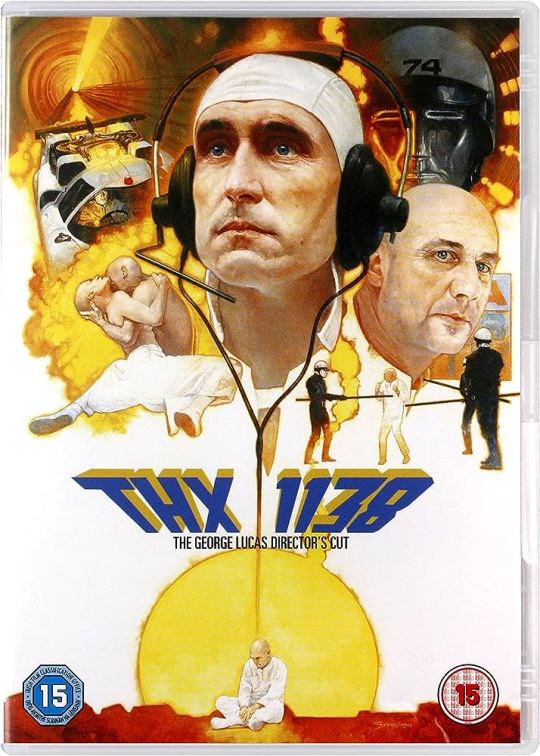
THX 1138
Rating: ❓❔❔❔❔
Honestly forgoing my usual rating system because ❔
29 notes
·
View notes
Text
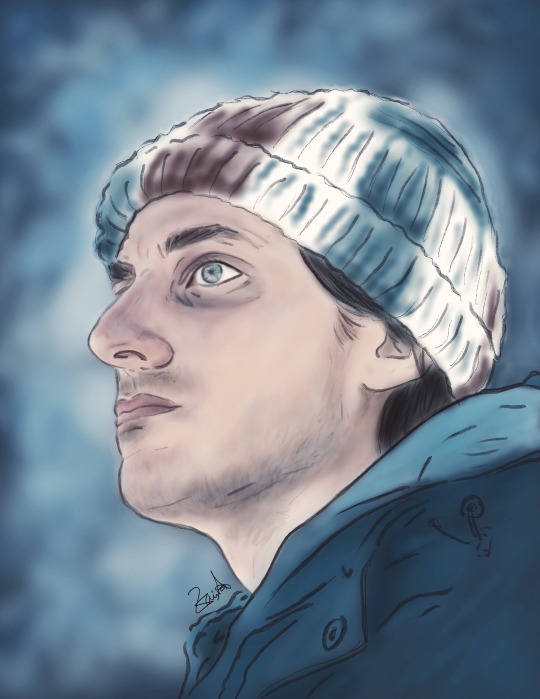
Luca Marinelli as Pietro in The Eight Mountains
Earlier this week, I had the opportunity to watch The Eight Mountains in the theatre. Here are some of my thoughts…
The first thing that comes to mind is that this is such a Luca movie. In the way there’s no neat bow at the end. It leaves you not quite satisfied, yet not unsatisfied either, just with lots of thoughts and questions.
I’ve heard that some people think it’s too long, but I have to disagree. It is long. At some point you will undoubtedly think “wow this is a long movie”, but this feeling of length, of time passing in quietude is as much a part of the movie as the vast mountains that create its breathtaking backdrop, seemingly endless, something to carve your memories into and come back decades later.
It’s a movie that gives you time to muse and room to breathe, and things happen without much build up. They just happen.
Luca slips into it almost humbly, with the subtleness of the narrator. Sometimes he feels strangely out of focus, like he’s just a spectator in his own story. But he’s our guide, and we follow along at the end of his rope as he finds his way, and we see the world through his eyes, stark but beautiful. Pietro describes himself and Bruno as silent men, and so what we learn about them we learn from watching them more than listening to them. But there are these small moments: a laugh, or a line that pulled me right in and made me feel a sudden closeness to Pietro—a testament to just how good Luca is.
In some ways I felt like the movie isn’t trying to tell us so much about these characters but about ourselves. Which mirrors Pietro’s experience of trying to understand and feel close to his own father by following in his footsteps to the top of the mountains he climbed, only to realise how little he knew him. And then there are Bruno and Pietro, who are so different from each other, and yet share something intangible, because they know one another, or a part of one another, because they walked that path in life together. That in the end is what friendship is about, the movie seems to tell us: to know someone, and to be known by someone, like no one else could.
120 notes
·
View notes
Text
Zendaya commands the screen with no caveats. She’s not ‘good with what she’s given’ (Dune) or ‘good despite the mediocre writing’ (Euphoria). She’s just… good. No, she’s great. No, she’s the best. She’s so good in this role, it’s impossible to imagine anyone else playing it. She utilizes her celebrity as well as her acting talent to create a larger than life figure still human and recognizable.
‘Challengers’ Is Catnip for Bisexuals — And Finally Gives Zendaya a Role Worthy of Her Talent. AutoStraddle
#zendaya#tashi donaldson#tashi duncan#mike faist#josh o'connor#luca guadagnino#challengers#challengers review#challengers movie#bisexual#lgbt film
13 notes
·
View notes
Text
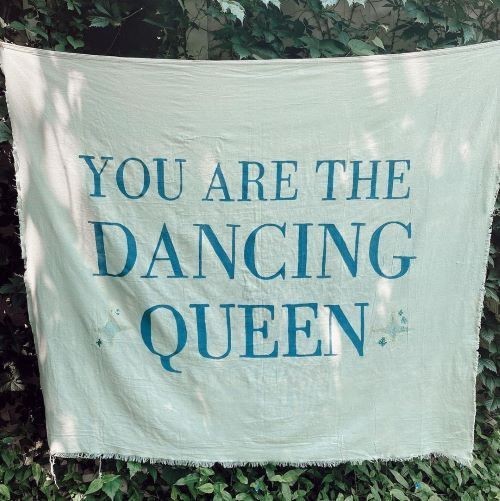


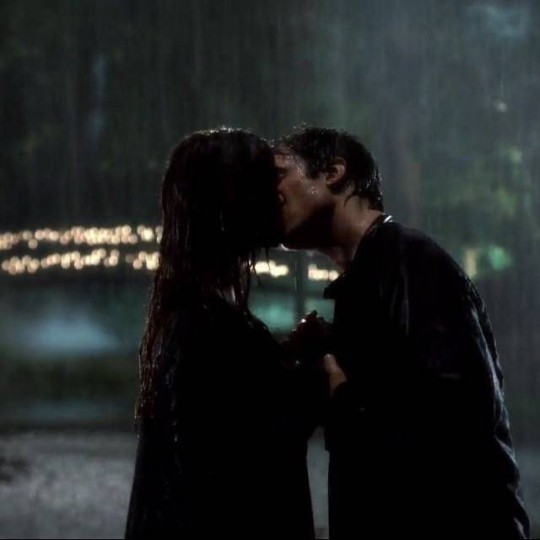





The American Roommate Experiment ~ Elena Armas
#book quote#book quotes#bookworm#books#booklr#books & libraries#booksbooksbooks#bookish#booklover#book review#elena armas#the american roommate experiment#the spanish love deception#lina martin#aaron blackford#lucas martin#rosalyn graham#oh rosie#rosie#lucasrosie#rosielucas#lucas and rosie#rosie and lucas#book moodboard#moodboard#mood board
160 notes
·
View notes
Text
the thing about lucas' departure from wayv-nct is that... unlike woojin or b.i, SM still manage him, he didn't move into another company or anything.
the separation is awkward rn but i'm just saying, if he appears on the next smtown, you know taeyong or kun will just pull him into the row of boys that is comprised of neocity-riize members without blinking.
#unless sm is being careful and petty and cowardice#so they will just exclude him#while other sm artists performs#cowards i tell you#COWARDS TO MAKE THE TRUTH CLEAR BUT NOT ON PUTTING THE BOY OUT FOR MONEY#i will say that until they proove me otherwise#were they this clear-foggy about taeyong as well??#i need to review things again gosh#concerning the text statement: the possibility of taeyong not giving a fuck and doing just that is very high#like even raiden came to smtown#and he's not that much on the hot kpop sphere#if any of raidens fans reads this#please be understanding i did not mean to undermean him in anyway#lucas wong#nct lucas#wayv lucas#...i don't even know if i can use those tags but how else do i say its that lucas#lucas renegade#i feel like this is thought material for twitter instead of tumblr but i deleted my twitty so anyhoo#i am asking for chaos by asking this#go on give me that slap#lucas' eyes are just so somber nowadays dude#i just...let him go to the weishenies please
10 notes
·
View notes
Text
Stranger Things Lucas on the Line Review

If you haven’t yet, be sure to check out my other Stranger Things Reviews. Like, Reblog, and let me know what your thoughts are regarding the show or the upcoming season! :)
Stranger Things Comics/Graphic Novels:
Stranger Things Six
Stranger Things Halloween Special
Stranger Things The Other Side
Stranger Things Zombie Boys
Stranger Things The Bully
Stranger Things Winter Special
Stranger Things Tomb of Ybwen
Stranger Things Into The Fire
Stranger Things Science Camp
Stranger Things “The Game Master” and “Erica’s Quest”
Stranger Things and Dungeons and Dragons
Stranger Things Kamchatka
Stranger Things Erica The Great
Stranger Things “Creature Feature” and “Summer Special”
Stranger Things Tie-In Books:
Stranger Things Suspicious Minds
Stranger Things Runaway Max (Part 1 of 3)
Stranger Things Runaway Max (Part 2 of 3)
Stranger Things Runaway Max (Part 3 of 3)
Stranger Things Darkness On The Edge Of Town (Part 1 of 3)
Stranger Things Darkness On The Edge Of Town (Part 2 of 3)
Stranger Things Darkness On The Edge Of Town (Part 3 of 3)
Stranger Things Rebel Robin Book and Podcast (Part 1 of 2)
Stranger Things Rebel Robin Book and Podcast (Part 2 of 2)
Stranger Things Hawkins Horrors Review
Stranger Things Flight Of Icarus
Stranger Things Episode Reviews:
The Vanishing of Will Byers (Part 1 of 2)
The Vanishing of Will Byers (Part 2 of 2)
Synopsis: Set between the events of seasons 3 and 4, the book follows Lucas during his freshman year of high school as he attempts to chart a different course for his life, taking up basketball as a means of trying new things and getting out of his comfort zone. However, Lucas soon realizes this won't be as easy as he initially thinks: His attempts to blend in with the popular crowd put him at odds with Mike and Dustin, his relationship with Max is deteriorating, and Lucas is forced to face hard truths about how insidiously racism is woven into Hawkins and what it means to be one of the few black kids in a mostly white town......
Observations:
Lucas on the Line acts as a conclusion to what I call "The Outcasts Trilogy," which began with Rebel Robin, followed by Flight of Icarus, and ending with this book. All these Tie-In novels center around three characters (Robin, Eddie, Lucas) who are considered outcasts in Hawkins: Robin is secretly a lesbian in a homophobic culture, Eddie is the town freak due to his interest in D&D, guitar, his low socioeconomic status, and his family's reputation because of his dad's criminal past, and Lucas is a black kid in a society where racism and prejudice are still prevalent. All 3 characters deal with feeling inadequate and unwanted, and attempt to cope with their situations by either blending into the crowd, or else attempting to escape Hawkins. All 3 of them eventually face hard truths and learn to stop denying the aspects of themselves that make them unique.
In Lucas's case, now that he's older and in high school, not only is he beginning to realize the implications of what it means to be black in a neighborhood where racism still lurks, but he's also beginning to understand his family's history, as well as coming to terms with an uncomfortable truth: As much as his friends care about him, they will never truly understand the bigotry and micro-aggressions Lucas is forced to endure as a person of color.
The show has touched on themes of bigotry and racism before, both in Lucas's interracial relationship with Max (which makes him a target for Billy) and the type of bullying he experienced from Troy and James. However, this book expands on those themes by going more into Lucas's fears and insecurities at being discriminated against for being a nerd AND being black, as well as finding someone who understands what he's going through. It also, IMO, deconstructs the "token minority" trope by showing what it's like to be considered that in a group of white friends from the perspective of said minority character, and how dehumanizing it feels.
This book left a lot to ponder. It's not perfect, and there are some flaws in its structure (mostly relating to continuity errors and missed opportunities), but it does inspire discussion, and gives a solid point-of-view to Lucas's character.
Part 1: Lucas's Journey
For as much as this fandom talks about Steve's character development (not that the discussion is unwarranted), Lucas is also another character (next to his sister Erica) who's had subtle but notable growth over the course of the show.
Season 1 had Lucas start out as a loyal member of the Party who was invested in finding Will, but also at odds with Mike and Dustin over El due to his distrust of her (something which got him a lot of flak from fans at the time). All of this came to a head in the junkyard when Lucas realized El was deliberately misleading them so they wouldn't find the Gate, leading to an ugly fight within the group. However, once things settled down, and Lucas realized El's misdirection was her attempting to keep them safe and not an act of maliciousness, he apologized for how he acted (with El also apologizing for lying) and welcomed her into the group, formally accepting her as a friend and member of the Party. Notably, in spite of his misgivings, he never betrayed El to the authorities, demonstrating that his heart was in the right place.
Season 2 continued on with this development. Contrast Lucas's acceptance of Max into the Party and his willingness to reach out to her vs how he initially acted with El in S1. It's notable since, at the time, Mike was hostile towards the idea of Max becoming part of the group. While Lucas had a crush on Max (which is normal for a boy his age), what separated him from the others was his willingness to listen to Max, who had always felt unheard in her house. That conversation on the bus rooftop in S2, where she opens up to Lucas about her home life and how she fears she's becoming like Billy, was meaningful to both of them, not just in Lucas reassuring Max she was a good person, but also Lucas really seeing Max for who she was and loving her for it. And in spite of the threat Billy posed, Lucas refused to be scared off by him (even kneeing Billy in the groin when he pinned him to the wall), and that willingness for Lucas to fight for Max was one of the many reasons Max finally stood up to Billy and made it clear to him that she was done with his abuse.
Season 3 showed Lucas was still navigating his relationship with Max (after getting dumped 5 times), as well as doing his best to advise Mike about his relationship with El. He also got some cool moments, from saving El from the Meat Flayer by chopping off its tendril, to gathering the fireworks to use against the Meat Flayer at the Battle of Starcourt. In spite of this, I remember at the time some fans (including me) wished Lucas had a bigger role in the story. The Duffer Brothers must have heard those criticisms because Lucas ended up getting his own arc in the next season.
There were a lot of great moments in season 4, but Lucas's story was a favorite for me because of how relatable it was. He was in high school trying for a fresh start. He still participated in D&D (Hellfire Club) but also joining basketball because he wanted to break out from being the nerd who was picked on all the time, and because he enjoyed the sport and wanted to give it a shot. He was discovering his identity, which is a big part of the high school experience. Adding onto this, a part of him wanted to achieve popularity as a way of being recognized instead of constantly looked down upon. He got what he wanted when he won the basketball championship............and then experienced firsthand the darker side of popularity, which forced Lucas to ask himself if this is what he really wanted.
Lucas on the Line expands more on the S4 arc by showing the events that led to Lucas doing basketball, and how that put him at odds with Mike and Dustin for a while. We also get to see the circumstances behind his breakup with Max, as well as her spiral into depression following Billy's death.
Something I appreciate is the book doesn't shy away from the trauma and PTSD Lucas is dealing with. The show usually gives that focus to characters like El, Max, Will, Joyce, Hopper, and Nancy, so it's refreshing to see how Lucas has processed everything since Will's disappearance in 1983. The answer is not well. It's even gotten worse since the Battle of Starcourt:
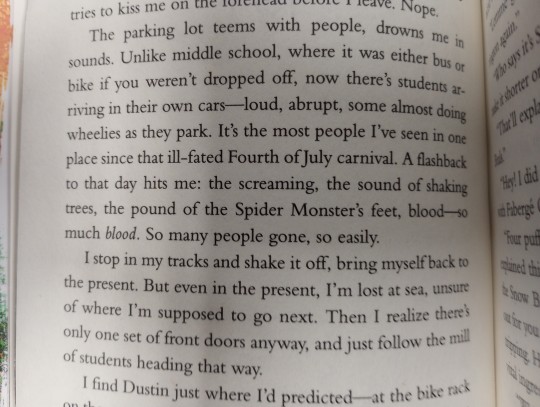
Similar to the way Robin in her novel talks about Hawkins High as a metaphorical monster, there are multiple instances where Lucas makes comparisons between his living situation in Hawkins and the Upside Down:
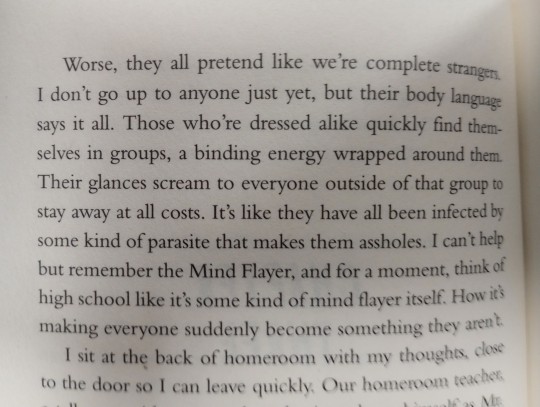
Granted, this is a metaphor that anyone who's watched the show enough times can pick up on: For as much as Hawkins presents itself as an idyllic neighborhood, there is rot within it, and NOT just from the Upside Down. The town has deeply rooted bigotry entrenched in its structure that takes on many forms (racism, homophobia, bullying, fear-mongering, forced conformity, etc) which the characters are forced to endure on a daily basis. From a symbolic standpoint, the Upside Down is all the nastiness within Hawkins that's covered up with a pretty surface. It may be a town that presents itself as perfect, but the moment you actually take a closer look at your surroundings, you realize that "perfectness" isn't genuine, and that people who present themselves as friendly can reveal just how awful they are in the right circumstances.
I live in a neighborhood like this, and I've been forced to learn time and again that some people in my town (though not all of them) have deeply rooted prejudices and will normalize being cruel because they can get away with it, all the while justifying their behavior as normal. Becoming cynical and cautious is how I've survived it. It reminds me of how Max thinks about her abusive situation with Billy: If you keep the monsters close to you, you're never caught by surprise.
Getting back to Lucas, he's painfully aware of this. Part of his PTSD and trauma isn't just from encountering the horrors of the Upside Down, but also from all the years he was bullied in school:
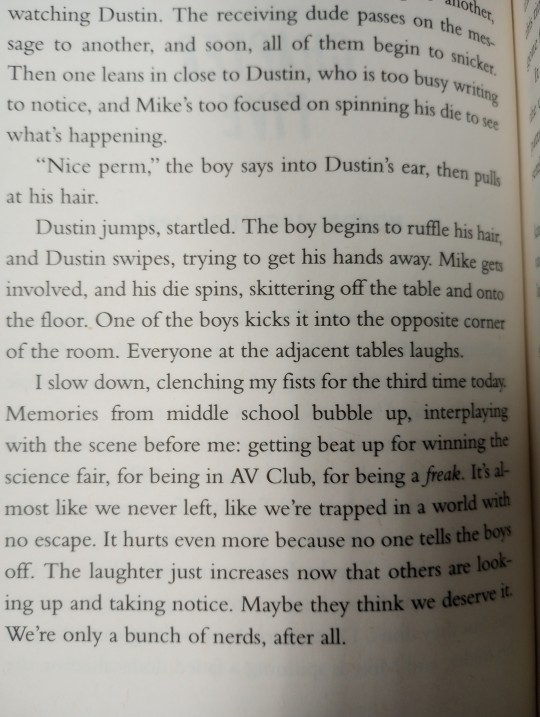
Lucas explains this to Mike and Dustin on the show, but part of his reasons for joining the basketball team is because he thinks it'll get him in with the popular crowd, and people will stop harassing him. What he doesn't understand (and what Mike and Dustin pick up on pretty quickly) is that even if Lucas changed everything about himself to fit in, he will always be walking on eggshells with that group. If he does everything right, he'll be tenuously accepted, but if he gets one thing wrong, or makes the team look bad in any way (even unintentionally), they will rip him to shreds. I even question what would've happened if Lucas failed to make the winning shot at the championship game: Would the team and the crowd have been as accepting of Lucas for that, or would he have been ostracized on the spot?
I know there are people in this fandom who vilify Mike and Dustin for going to Hellfire Club over Lucas's basketball games. As time has passed, I maintain they made the right call. Not only were they bullied by the basketball jocks way before they joined Hellfire Club (with Jason doing nothing to stop it), but they could see Lucas was deluding himself, and that these were not the kind of people they wanted to be friends with. At least with Eddie, they were accepted for who they were without having to make major changes to their identities to fit in. Even with Lucas, Eddie still welcomed him into the Hellfire Club despite his initial reluctance and the fact Lucas was on the basketball team. He didn't care that Lucas was black (which was a problem for several white basketball jocks like Lee Garroway) or that Lucas had extracurricular activities outside of Hellfire. He just cared that Lucas wanted to be there and was willing to invest in their D&D Campaign.
(SIDE NOTE: This is a big reason I roll my eyes hard at Billy stans who whine about Eddie being a similar replacement for Billy. The major differences between Eddie and Billy is a.) Eddie wasn't a bully, b.) Eddie didn't care about becoming Kings of Hawkins High like Billy did, and c.) Eddie could afford to be in the same room with Lucas for more than 30 seconds without being racist towards him or wanting to attack him. Enough said.)
And it should be noted that while Mike and Dustin are skeptical about Lucas doing basketball, they eventually accept it and even show up to one of his basketball practices (along with Erica) where Lucas does his best and still gets shit from his teammates for how he played.
Both Mike and Dustin saw how Lucas was being treated, as well as the fact Lucas was benched up until the championship, and they rightfully concluded that even if Lucas became popular, a.) It wouldn't change how THEY were being treated (no matter what Lucas told them), and b.) Lucas would forever be trying to live up to expectations from others until he became a shell of his former self. It's a lot like what Chrissy Cunningham went through where she maintained the perfect popular image as the Queen Bee of Hawkins High at the cost of her mental health and well being.
To Lucas's credit, he eventually realizes this at the end. As angry as he was at Dustin and Mike for skipping the Championship, he came to understand why they made that decision. When the time came between choosing Jason and the basketball team vs his friends, he chose his friends:
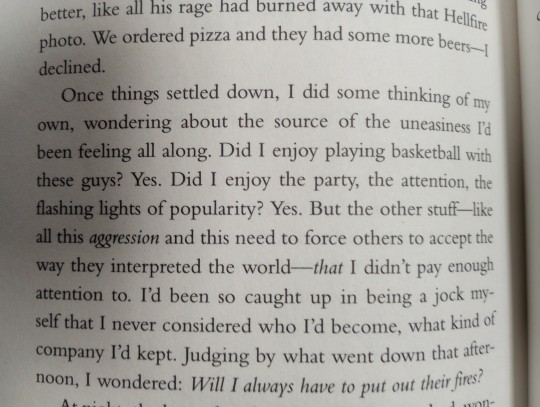
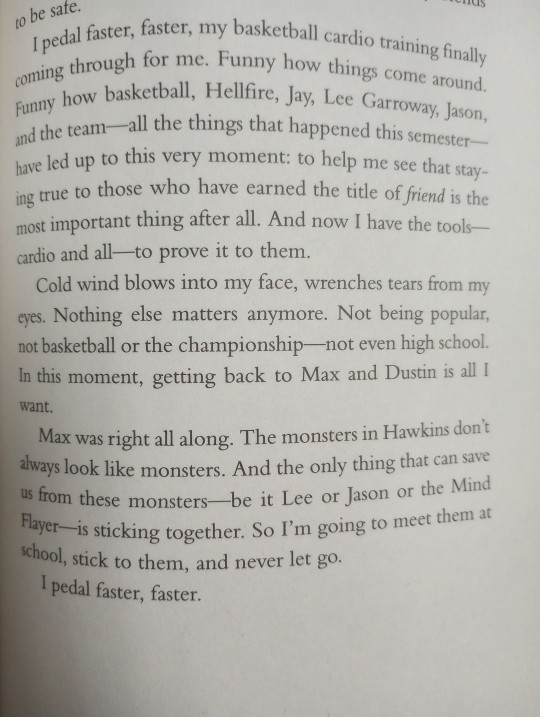
Caleb McLaughlin even noted this in an interview post S4: Lucas wanted to find acceptance, but the problem is you can't force other people to accept you. Mike and Dustin, in spite of their flaws, accepted Lucas for who he was. Jason and the other basketball players (with the exception of Jay) only accepted Lucas when he either made the team look good, or when they wanted something from him.
This doesn't necessarily mean the book (or even the show) paints Lucas wanting to do basketball as a wrong thing. It was a choice like everything else. Lucas's reasons for wanting to do basketball went beyond just wanting to be popular: He wanted to try something new. He wanted something he was passionate about. Not only did he find that, but he also got to share it with another teammate who understood him: Jermaine "Jay" Demario.
Part 2: Lucas's Relationships with other characters
Jay is a new character from the book who's not only one of the few black kids in Hawkins, but also one of the only basketball players who treats Lucas decently and takes him under his wing. He's the one who encourages Lucas to step out of his comfort zone and try out basketball. He's also one of the few jocks (though he doesn't consider himself a jock in the traditional sense) who's a decent person, and Lucas looks up to him as a mentor the same way Dustin does with Steve. Jay gives Lucas useful advice about balancing his extracurricular activities with other aspects of his life, and he's the one who trains Lucas to do well at basketball, from practicing after school with him, to having Lucas check out videos of NBA playoffs and finals to improve his skills. He also accepts Lucas wanting to do Hellfire Club, and tells him there's nothing wrong with being both a jock and a nerd.
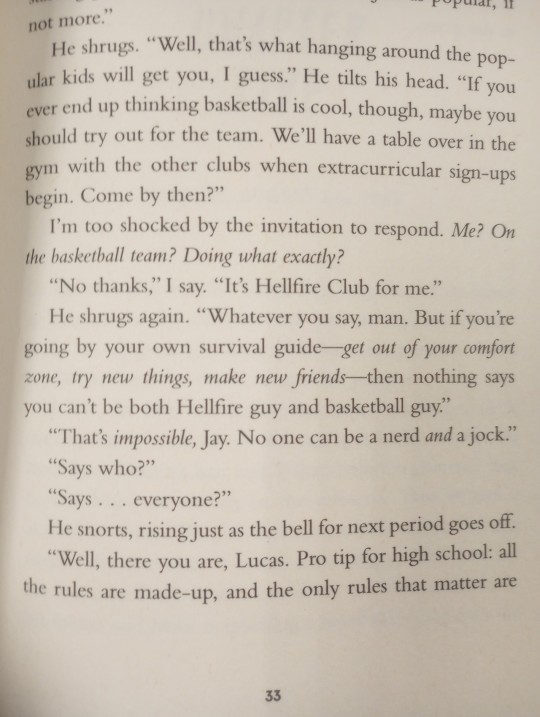
Speaking as someone who made Varsity for cross-country and track & field AND took AP classes during high school, I can relate to that last bit! 🙂
Jay was a cool character, and I'm sad he wasn't in the show. It's nice Lucas was able to have a friend, however briefly, whom he could confide in, and who understood the issues Lucas dealt with because of who he was and where he lived (more on that in a minute).
Erica's relationship with Lucas also gets a bit more time here. She's still snarky towards Lucas, but there are moments demonstrating she cares for him. For instance, despite initially criticizing how Lucas played during a practice, she is pissed when Lee and some other basketball players call Lucas a racist slur:
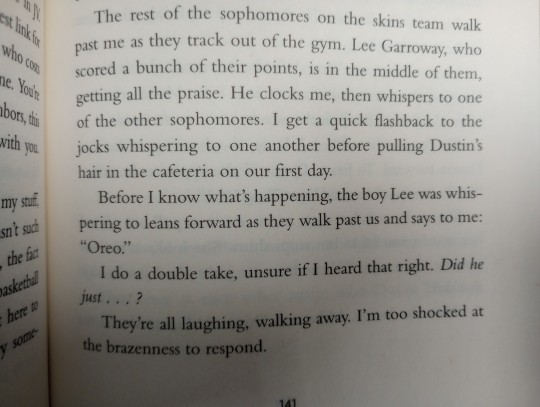

Later on, after Lucas becomes the target of a bomb threat, there's a quiet scene where Erica comes in to hang out with Lucas. Even though she doesn't verbally say it, it's clear from her demeanor she's genuinely worried for Lucas's safety:

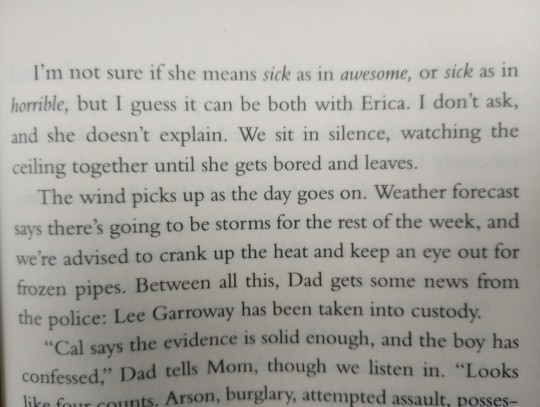
She may exchange barbs with him, but she knows where to draw the line. The fact she also showed up for all of Lucas's basketball games on her own accord (minus the championship) despite Lucas being benched conveys she supports her brother in her own way. I liked the evolution of Lucas and Erica's relationship in S4, and I'm hoping that continues into S5. If the final scenes of S4 are any indication of foreshadowing, they'll likely be working together, so we'll probably get to see more of their sibling dynamic.
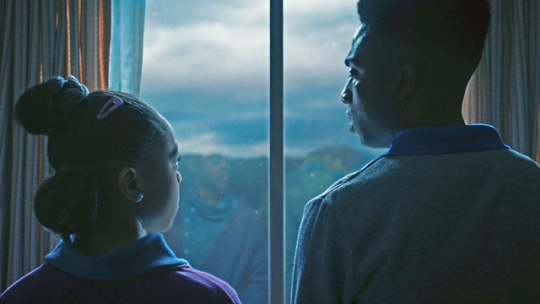
Max's relationship with Lucas also gets focus. For the most part, they are not in a good place. Ever since Billy's death at Starcourt Mall, Max has fallen into a deep depression and become withdrawn from everyone, including Lucas. A good chunk of the story is Lucas trying to reach out to Max and make it clear to Max that he's there for her. The problem is he doesn't know how since Max keeps rejecting any attempts to hang out with him, or for him to help her. The dynamic is sadly realistic for anyone who's had friends or family who suffer from chronic depression and feel frustrated or helpless when they try to help that person recover. Lucas does everything he can for Max in the book, from giving her the space she needs, to offering to listen to her. We also get to see Lucas's perspective on why he cares so much for Max (just like Max's novel showed us why she was attracted to Lucas):

What's sad is Max does understand what Lucas is trying to do. She knows he cares about her. At the same time though, she can't pretend things are normal anymore, or that she doesn't feel immense guilt over how she wished something horrible would happen to Billy and got her wish granted (as she admits to Vecna in the S4 finale), or that her life hasn't changed for the worse:
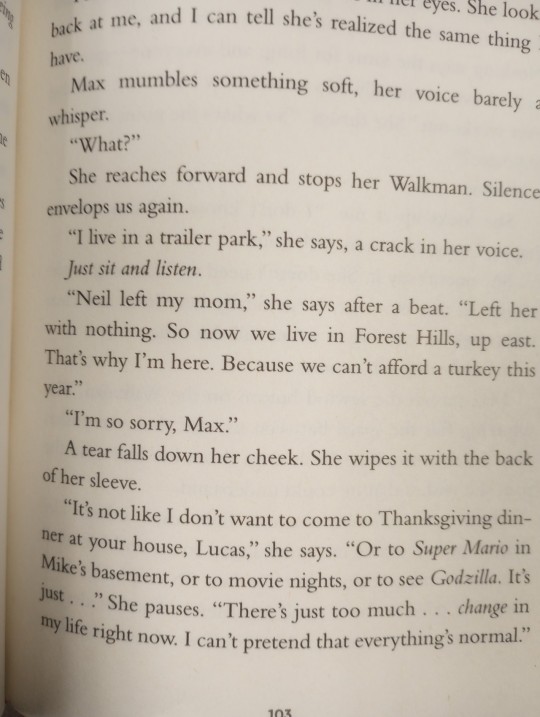
BTW, the breakup between Max and Lucas that's alluded to in S4 happens in the book. It's during Thanksgiving when Lucas sneaks out of his house to give Max some Thanksgiving dinner while she's at the skating park. It's also the first time Lucas hears Max play "Running Up That Hill" by Kate Bush and truly understands the meaning of that song........and what it means for their relationship:

What's admirable about Lucas is that, in spite of what's going on with Max and her attempts to distance herself from him, he still keeps fighting for her any way he can, right up to the end of the book when Vecna tries to kill Max the first time in the graveyard. And it pays off. Those memories she has of her time with Lucas, combined with the moments she shared with her friends, allow her to break free from Vecna, to remember she has something to live for, that she has people who care about her, and that she doesn't have to be consumed by guilt over what happened to Billy.
Speaking of Billy, the few times Lucas brings him up, he does NOT talk about Billy in a positive light. If there was any doubt about whether Lucas hated Billy, this book puts that to rest. One passage in particular stuck out:
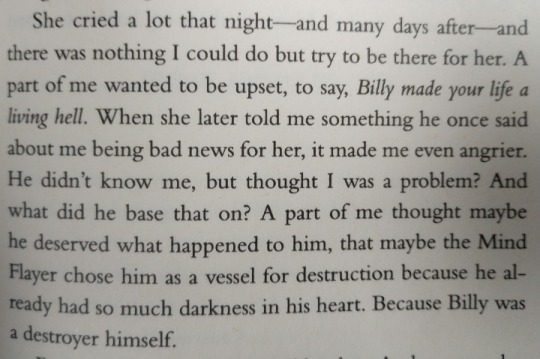
I know Lucas is projecting his anger towards Billy in this moment (not that I blame him), but the idea that Vecna/The Mind Flayer was drawn to Billy because of the darkness in his heart is an interesting idea. We know Vecna initially spared El at Hawkins Lab while killing the other kids because he saw a lot of himself in El (both with her struggles developing her powers, and her treatment under Brenner and her "brothers/sisters") and believed El would be grateful to him for "saving her." It's also implied on the show (and by Vecna's actor, Jamie Campbell Bower) that Vecna feels the same way about Will, which is why he has a creepy interest in him. Billy in many ways resembles Vecna in his rage and sadistic desire to hurt everything and everyone around him, and that aspect may have attracted Vecna to Billy. Granted, it's hard to know if that's the case since Billy was initially driving that night to hook up with Karen before crashing by the warehouse where that piece of the Mind Flayer was nesting, but it's also possible Vecna could have sensed Billy before then, and thought he'd make a great candidate to put his plan into motion.
Then there's Lucas's relationship with Jason: Lucas picks up pretty quickly that something's off about Jason, particularly when he's preparing for the prep-rally speech by slamming his hands in the lockers hard enough to leave dents. Lucas also isn't impressed with Jason's speech, and rightfully notes that Jason invokes the Starcourt tragedy for "cheap audience reactions" (which is why Max looks hurt in the scene when Jason brings up Billy). There's also a scene after Jason's confrontation with Eddie in the cafeteria where he and Andy make disparaging remarks about people who live in trailer parks. When Lucas speaks out against that (because Max was forced to move into a trailer park after Neil left Susan), Jason loses his shit:
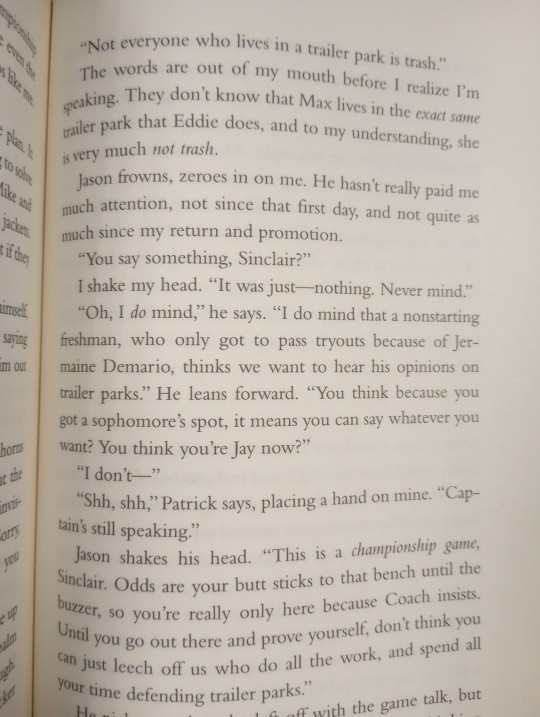
By the time of Chrissy's death when Jason's organized the basketball team into hunting down Eddie and tortures Gareth for information, Lucas finally understands just how unhinged Jason is, and even compares Jason to Billy:
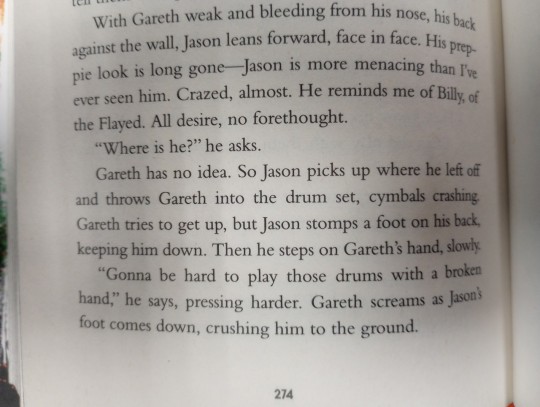
I know some people defend Jason on the grounds that Chrissy's death impacted him in a negative way, and that Patrick's later death made things worse because it happened under circumstances that couldn't be explained, which is why Jason jumped on the "Hellfire Club is a Satanic cult" bandwagon. While there is some truth to this, it ignores how Jason already had negative qualities brewing underneath, and that Chrissy's death didn't create these issues, but instead brought them to the surface in the worst way possible. Jason already had inherent prejudices against D&D and anyone he deemed as a "freak" (as depicted in the Flight of Icarus book) and the show established that he had a very self-absorbed, hot-headed, entitled attitude even before things got bad. Maybe he was initially able to keep these negative qualities under control, but they didn't magically manifest out of thin air just because Chrissy died.
Regardless of whether we chose to admit it, we all have a dark side. We all have aspects of our personality we're not proud of. Jason is no different in that regard. The problem is the lack of self-awareness on his part about those flaws, combined with his self-righteous belief that he was doing the right thing even though his actions put innocent people in danger.
I could sympathize with Jason over the deaths of Chrissy and Patrick, but my sympathy ended when he organized a Witch Hunt against the Hellfire Club (who had NOTHING to do with Chrissy and Patrick's deaths) and not-so-subtly threatened Nancy at the gun store and made it clear he intended to go after Mike. At that point, I was done with him. Judging by the final conversation between Lucas and Jason, where Jason refuses to hear Lucas's explanations about what's going on because it doesn't fit with his preconceived notions, Lucas was done with him as well:
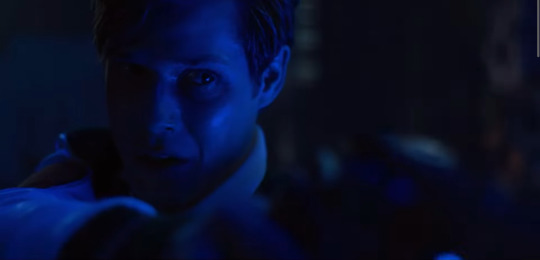
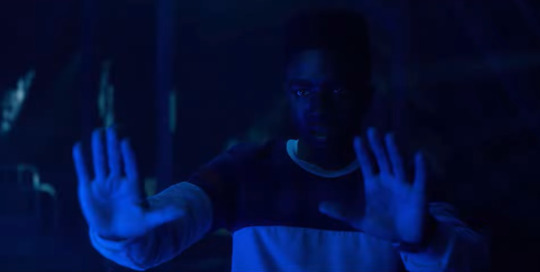
Jason: "I never should have let you in the door."
Lucas (coldly): "And I never should have knocked. I thought I wanted to be like you. Popular. Normal. But it turns out normal's just a raging psychopath."
Truer words have never been spoken.
Part 3: Lucas's Experiences with Racism and Bigotry
Lucas has been made the target of racism by characters like Troy, James, and Billy on the show, but this book is where Lucas begins to understand the full ramifications of what it means to be black in a world where racism is ingrained into society. We also get to see how it psychologically impacts Lucas and feeds into his worst insecurities.
Take Lucas's introduction to the basketball team for instance: For the most part, his tryout is average (not awful, but not spectacular), but Jason still allows him on the team for one particular reason:
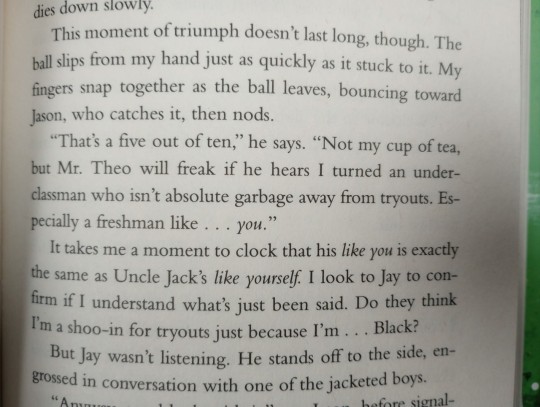
There's always been a question in the fandom about whether Jason was racist in the same way Billy was. I know Caleb doesn't think so, and argued Billy was worse (and given the the amount of mental gymnastics certain fans have done to pretend Billy wasn't racist, as well as Caleb's experiences with racism in the fandom, I get where his position is coming from), but this book suggests otherwise. Jason may not have been as overtly racist as Billy was, but there is a soft bigotry at play here in Jason allowing Lucas on the team BECAUSE he was black as opposed to Lucas's actual skills. Some people will probably argue against Jason being racist because of his friendship with Patrick, but that's basically the "I can't be racist because I have a black friend" argument.
What's depressing is this haunts Lucas for the remainder of the book. In spite of how hard he practices to get better, he can't shake off the idea that he was only let on the team because of his skin color (and because of the stereotypical idea that all black people do basketball), and not because he earned it. This is reinforced by other members of the basketball team, led by Lee Garroway, who not-so-subtly takes every opportunity to remind Lucas of this:

Speaking of which, this book introduces another bully in the form of Lee Garroway, and he's a loathsome piece of work. Like Billy, he is outwardly racist towards Lucas, but he takes it a step further in targeting both Lucas and Jay because he, along with several other members of the team, are pissed that they made it to the subs roster (thinking Lucas and Jay only got that position because they're both black) and could potentially make Varsity, which is a position they all want. This all culminates in Lee rigging both Jay and Lucas's lockers to spray them with glitter, and then later rigs Lucas's locker again with a bomb that almost kills a janitor working at the school. Lucas manages to catch Lee in the act by planting a camera in his locker after the first attack, and even though the footage gets Lee's friends expelled, Lee is still let off the hook because his father is a donor to the school and bribes Mr. Higgins into covering it up. It's similar to what happened in Flight of Icarus when Eddie accuses Mr. Higgins of looking the other way when it came to athletic players like Tommy and Jason who bully other students and are allowed to get away with it because their fathers have the principal in their pockets.
Remember that profoundly stupid comment from the Angela apologist I talked about in my review of Darkness on the Edge of Town?

This is why that comment struck a nerve: Putting aside how this take is completely devoid of critical thought, it misses the fact that the reason bullies like Angela, Jason, Tommy, and Lee feel justified in their behavior is BECAUSE most of the adults enable them. At best, they do the bare minimum in disciplining these teens, and at worst, they look the other way and punish people like El and Eddie who try to stand up for themselves and others.
And I'm sorry, but the "They are children, none of them are responsible for what they do" excuse can take a flying leap into a volcano for all I care. If you deliberately make a bomb that you know will put someone in the hospital (or even get them killed), you are responsible for your behavior. This isn't like Lee was incapable of understanding what he was doing was wrong. To imply otherwise is stupid beyond belief. 🙄
What's infuriating is not only does Lee barely get a slap on the wrist for what he did, but the bomb threat was enough to cause Jay and his family to move, meaning Lucas lost one of the few friends he could depend on.

On top of that, this isn't even unique to Jay's situation. Both of Lucas's parents also have history which involved moving around to find a place where they could, at the very least, be tolerated in their community. All the while, they knew on some level they'd never truly be accepted:

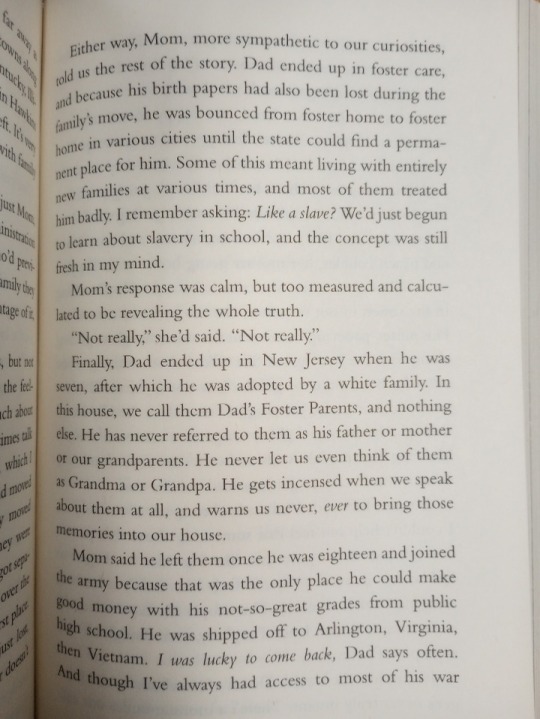
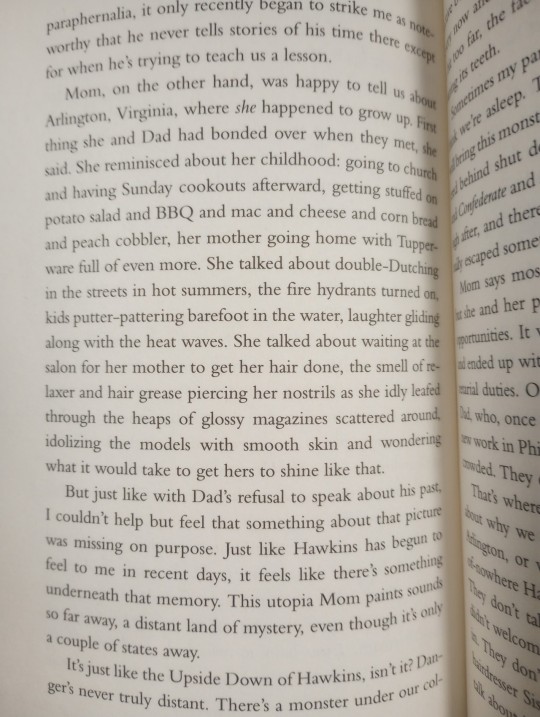

Lucas's parents did the best they could in trying to protect Lucas and Erica and raise them so they wouldn't have to go through the same circumstances they did. The problem though is that racism has become normalized to such an extent that there isn't a way to escape it.
On a related note, this is why I find the current attempts by Conservatives to stop Critical Race Theory from being taught in schools to be vile: These people want to pretend racism is a thing of the past, like it isn't still impacting people of color in the United States to this day, and are perfectly okay trying to whitewash history and limit any attempts at discussion to achieve that goal. It's been an ongoing issue where I live (to the point that last year, three new members were elected to the school district so they could push their agendas and prevent CRT and other "undesired talking points" in schools), and I know it's been an ongoing issue elsewhere in the United States (*cough* Florida *cough*). John Oliver did a brilliant breakdown of this last year, and I highly recommend watching it:
youtube
Just like with many of the other books in this series (Darkness on the Edge of Town, Rebel Robin, Flight of Icarus, etc) Lucas on the Line illustrates that many of the social issues these characters experienced in the 80s continue to be a problem today. Very little has changed, and while people might be more willing to hide their bigotry, or pretend it's something else, that doesn't mean it's gone.
Part 4: Missed Opportunities and Continuity Errors
Like I said before, this book isn't perfect, and has its flaws. I can't speak for what notes Suyi Davies, the author of the book, got from the Duffer Brothers and Netflix, but there were some major contradictions that were hard to ignore.
For instance, there's a flashback where Lucas is supposed to be in third grade and first experiences discrimination against him when the other kids are afraid of swimming with him because they think his "blackness" will rub off on them. While the flashback is effective in showing the insidiousness of how kids can be bigoted at a young age, it's undermined by the date this flashback is supposed to take place in: June 6, 1981. At this point, Lucas would have finished fourth grade, not third grade. On top of that, it's mentioned that Lucas wasn't friends with Mike, Will, and Dustin yet, but that's not only contradicted by other tie-in materials, but also by Dustin's claim on the show that he didn't join the Party until he was in 4th grade, which would have been around 1980. For Lucas to be in third grade in 1981 and not know any of his friends at this point makes no sense.
Then there's the third act of the book, which takes place within the first four episodes of S4: The show establishes the events in those episodes takes place between March 21st-24th, 1986. However, the book changes this so it takes place between April 4th-7th, 1986. The reasons for this are unclear, especially since this book came out AFTER S4 premiered, but I suspect it may have something to do with "Birtdaygate" (i.e. the Duffer Brothers forgetting Will's Birthday was supposed to be on March 22nd). I can't tell if Netflix was trying to retcon the dates because they were embarrassed by "Birthdaygate," or if S4 was originally supposed to be set in April before they changed it to March at the last minute (which begs the question of why they did that), but it is something that's been on my mind for a while now.
Moving past these errors, I was disappointed the book didn't expand more on Patrick's character despite having the opportunity to do so. In the show, Patrick demonstrates a friendlier side to Lucas during their time together, and I know it was speculated at the time that there was more to his interactions with Lucas. However the book doesn't explore that angle, and we don't get a lot of information about Patrick. It's frustrating because, out of all of Vecna's victims, Patrick is the only one that doesn't get his backstory fully fleshed out. We see why and how Chrissy, Fred, and Max were targeted, but it's only implied in Patrick's case. Lucas speculates Patrick had an abusive father, but neither the book nor the show elaborate on this, which makes Patrick come off as a wasted character, especially when his death could have had a bigger impact on Lucas.
Finally, this is just a minor nitpick, but I was unhappy that the book didn't seize on the opportunity of Lucas and Steve playing at least one game of basketball. There's a scene in the book when Steve offers to go one-on-one with Lucas, and Lucas turns him down:

For the story's sake, I get why they had Jay be the one to practice with Lucas as opposed to Steve, but it still feels like a missed opportunity, especially when it was implied on the show that Lucas and Steve's had a better relationship after S2 following Steve protecting them from the demodogs.
Final Thoughts:
Overall, I would recommend this book. It's interesting seeing things from Lucas's perspective, as well as how he views his relationship with others, and how he copes with his trauma. The book does a stellar job exploring how the racism inherent in Hawkins has impacted Lucas's life and well-being, and it's also a relatable journey of finding your identity and rising above the stereotypes people place around you and your community.
As for where Lucas goes from here, I'm wagering that he'll have a role in bringing Max back from the coma Vecna's placed her in, and that they'll finally get that date night at the theaters.

#stranger things#lucas sinclair#racism#caleb mclaughlin#erica sinclair#sue sinclair#charles sinclair#anti billy hargrove#anti jason carver#mike wheeler#dustin henderson#max mayfield#lumax#patrick mckinney#jeramine demario#tgh opinions#tgh reviews#lucas on the line#stranger things lucas on the line#vecna#the mind flayer#bigotry#eddie munson#chrissy cunningham#angela stranger things#suyi davies#steve harrington
30 notes
·
View notes
Text
I absolutely love A League of Their Own for so many reasons, but one that I always circle back to is Greta and Jo’s relationship.
There were moments early on where I got nervous that they were going to do that stereotypical trope where one of them (Jo) is secretly harboring feelings for the other (Greta) and has to watch as they fall in love with someone else (Carson).
This scene in particular made me nervous they’d go down that route:
Because they frame it like Jo might be jealous of Carson. The first time I watched it, I internally groaned because god of course there can’t be two queers on TV who are actually just platonic friends.
But they didn’t do that !!
Jo wasn’t jealous of Carson, she wasn’t harboring a secret love for Greta. She was genuinely concerned and worried about her best friend, the person who she’s seen get hurt in ways I can’t even imagine. When she told Greta that she was different, Jo used Carson making Greta happy as her example. Like … how unhappy has Greta been for Jo to make that the statement point ?!
Anyways. Jo and Greta are the only ALOTO relationship I’ll fight to stay platonic. All the other ones yeehaw let’s go. I’m down for some good masc4masc rep w Jess and Lupe. Also some good good valley-girl-realizes-she’s-in-love-with-her-roommate Jo and Maybelle.
100 notes
·
View notes
Text
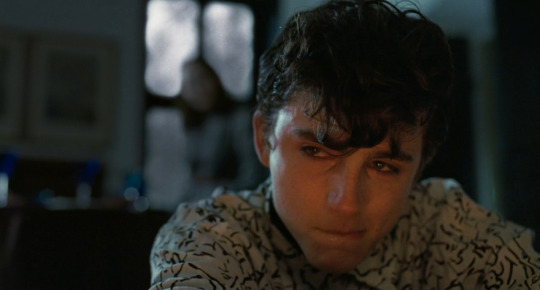
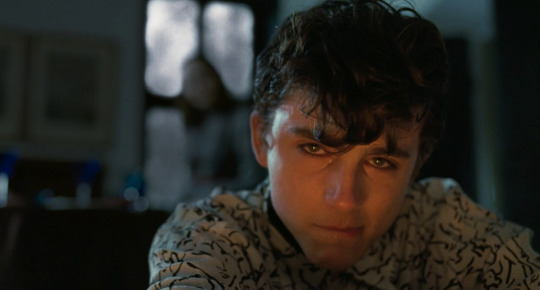
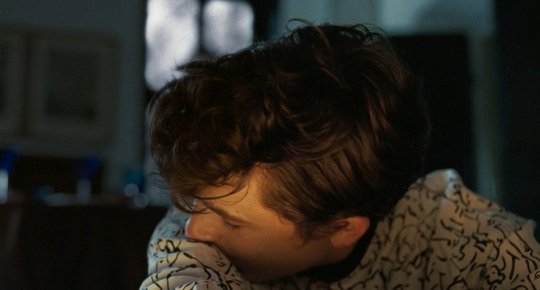
This time, the boy takes care that no one see his tears because what they lament is his newfound, unsought identity as someone no one can see. He looks “into” the fire, at nothing but an inwardness that he can no longer imagine finding expression in the blur of the Beautiful Life behind him. (Could he really explain to the parties concerned how completely the spontaneous bond they have formed around heterosexual marriage, and the right kind of sex, has annihilated him?)
The strength of the shot lies precisely in its uncomfortable prolongation, its stubborn dwelling on Elio as he would grieve his social death, while the credits rush him along like a quick-and-cheap funeral service. The exhaustively inclusive roll call of names seems to intensify his loss of both a name and a sense of belonging, almost as if he knew they were sharing the screen... Annella of course is the first to summon her son back to the Beautiful Life: “Elio?” Mechanically — it’s a familiar drill — he starts to turn his head toward her, but he pauses to wipe his eyes on his shirt before answering the call. For these are, effectively, the last tears of his youth; it is with “wash’d eyes” — in Cordelia’s sense of a cleared-up vision — that he will take his place at the dinner table. There, the film lets us suppose, the only thing that will diminish his enjoyment of the comfort foods on offer is the knowledge that he has just become, in every important sense, a ghost. And that knowledge, this more-than-exasperating film also lets us suppose, is what gay coming of age — so different from gay coming out — still amounts to.
"Elio's Education", D. A. Miller
#the only review on this movie that matters#d. a. miller#call me by your name#luca guadagnino#timothee chalamet#film#film stills#cinema#queer cinema#cinephile#film studies#my posts
7 notes
·
View notes